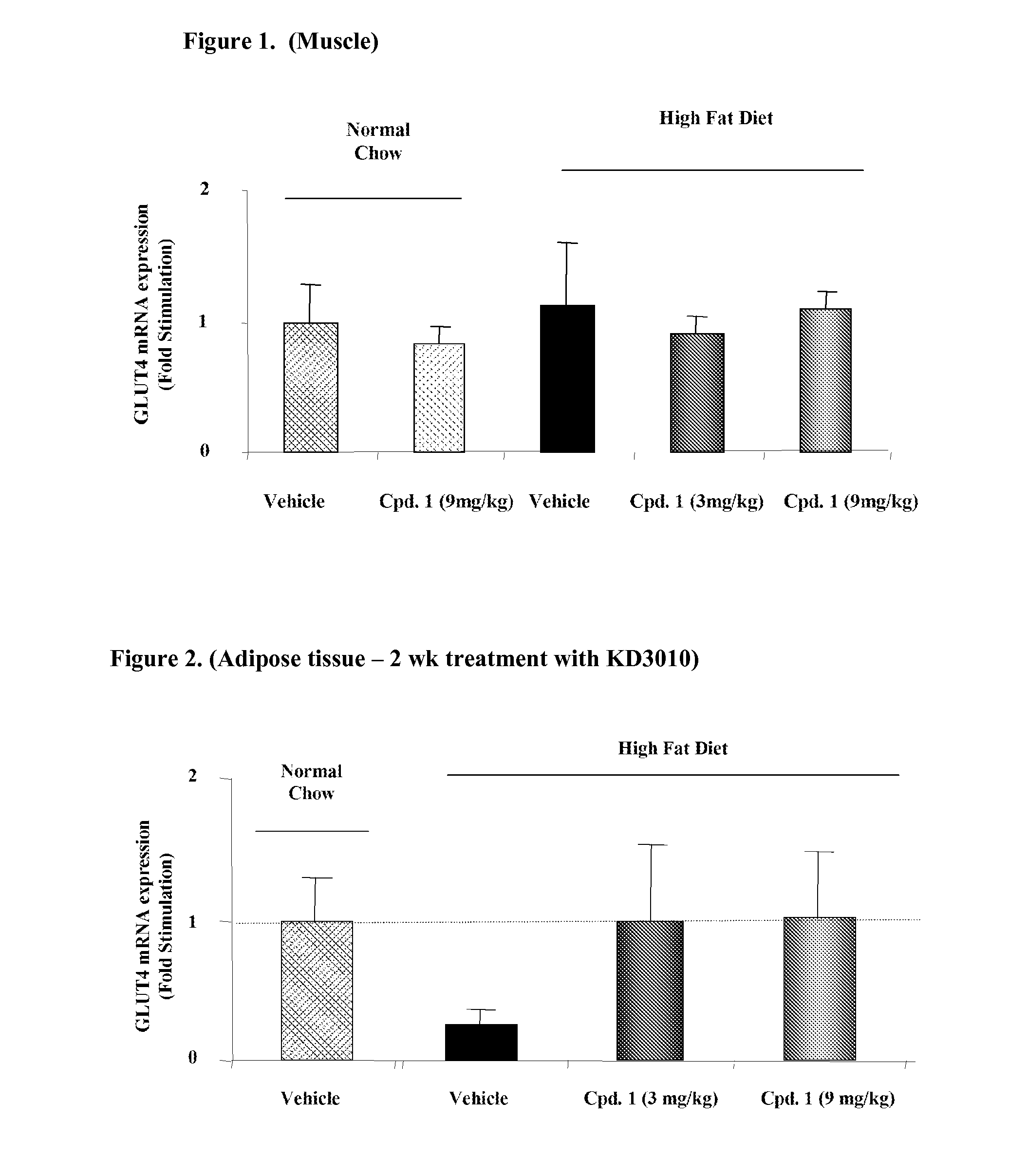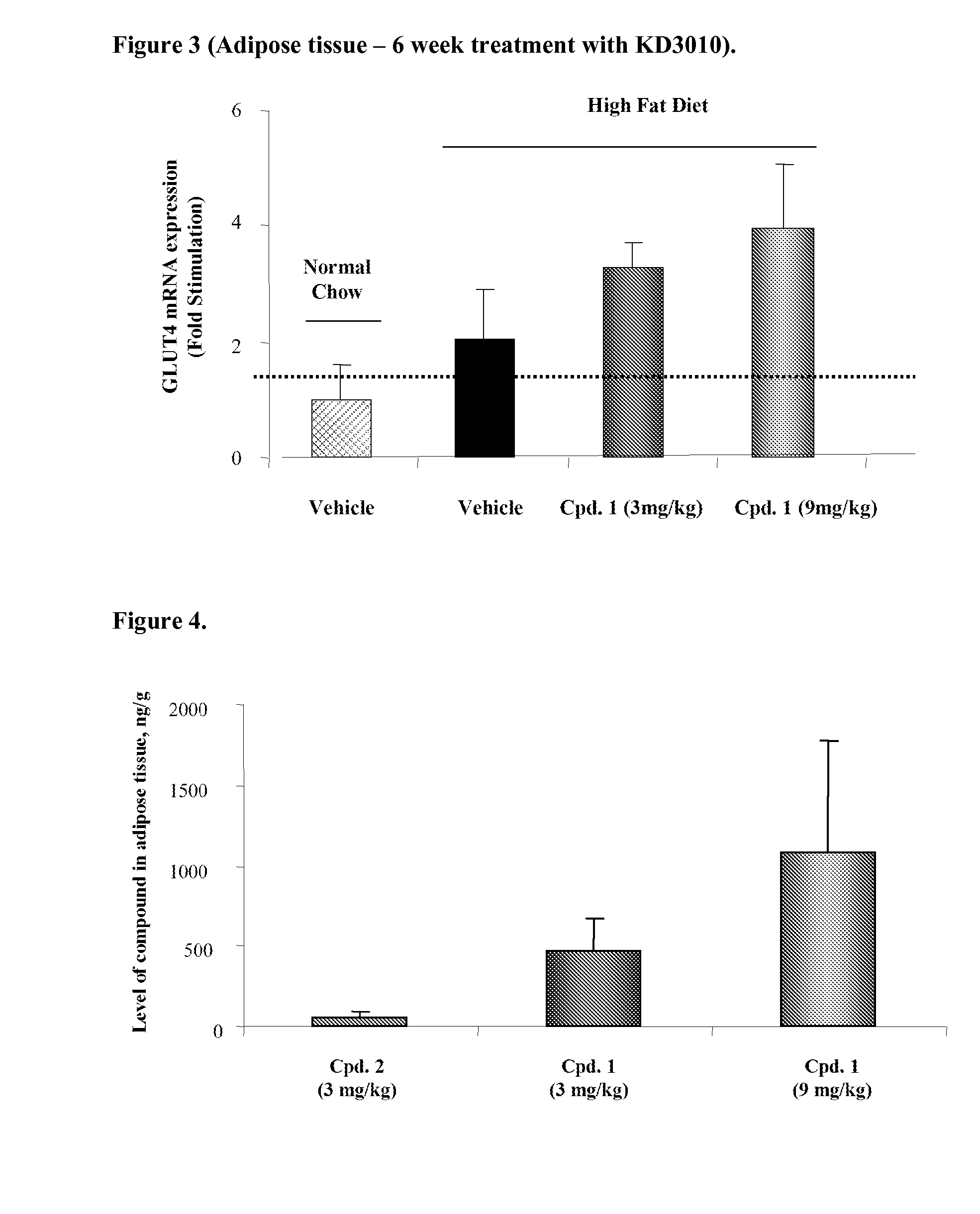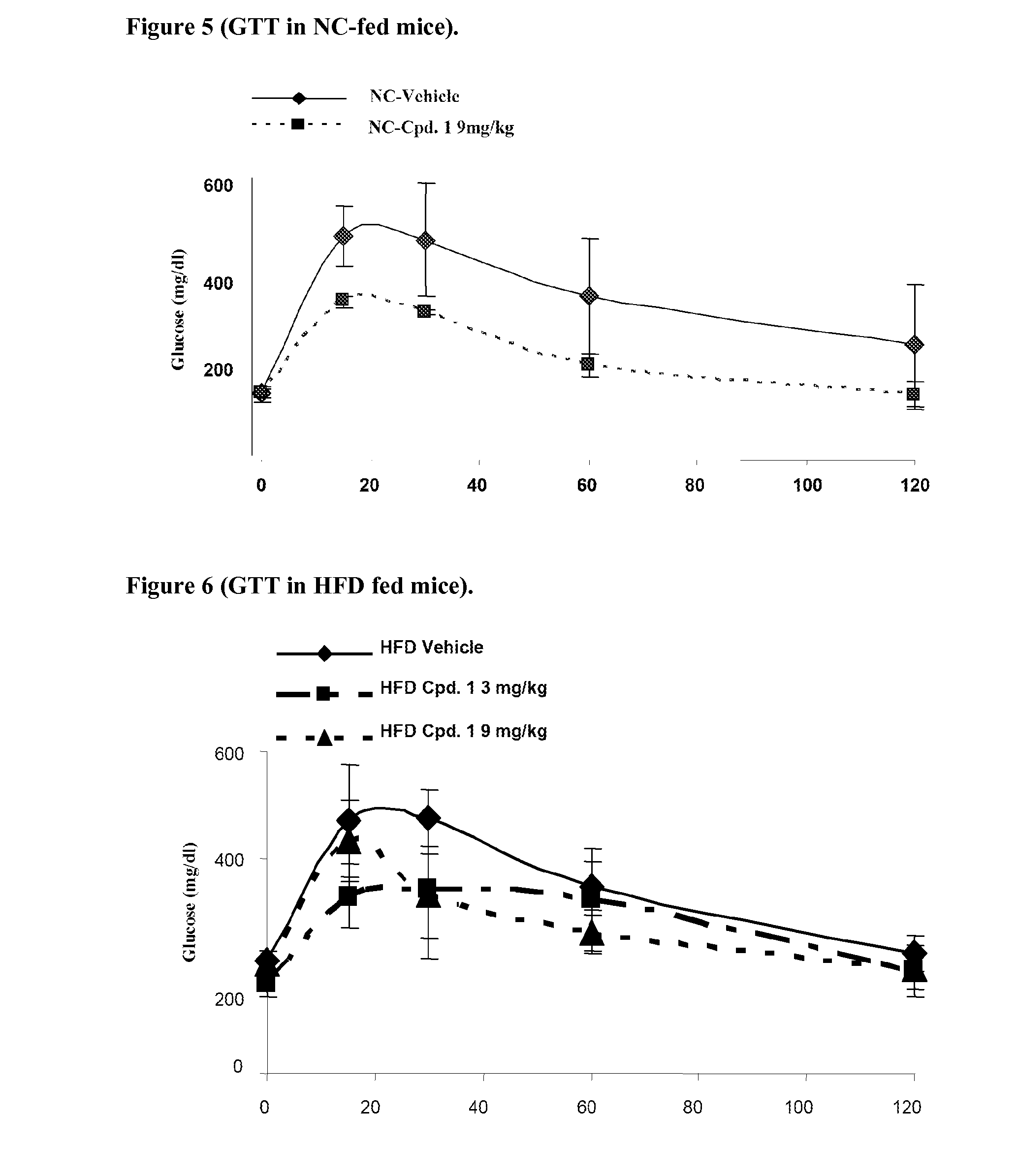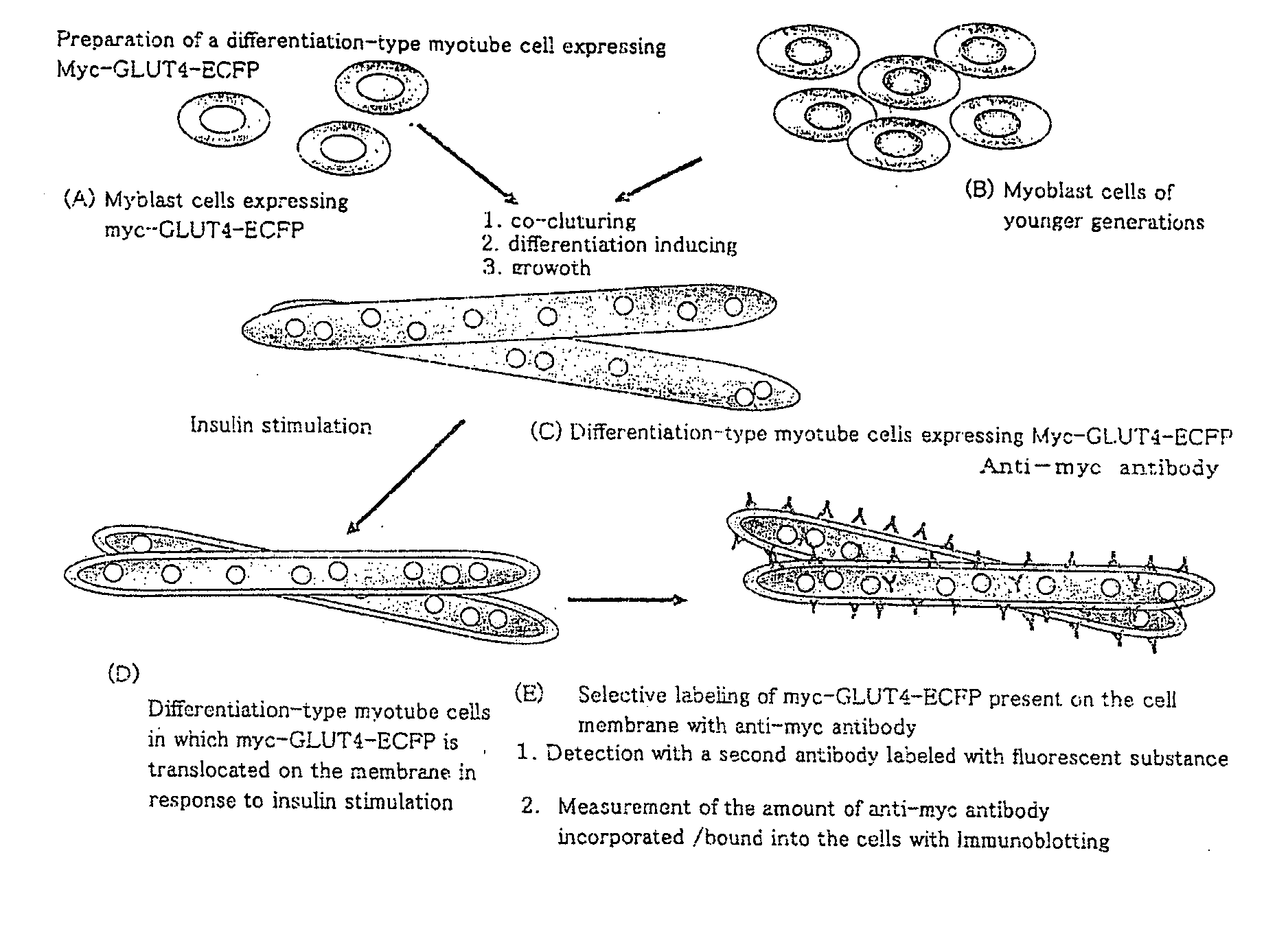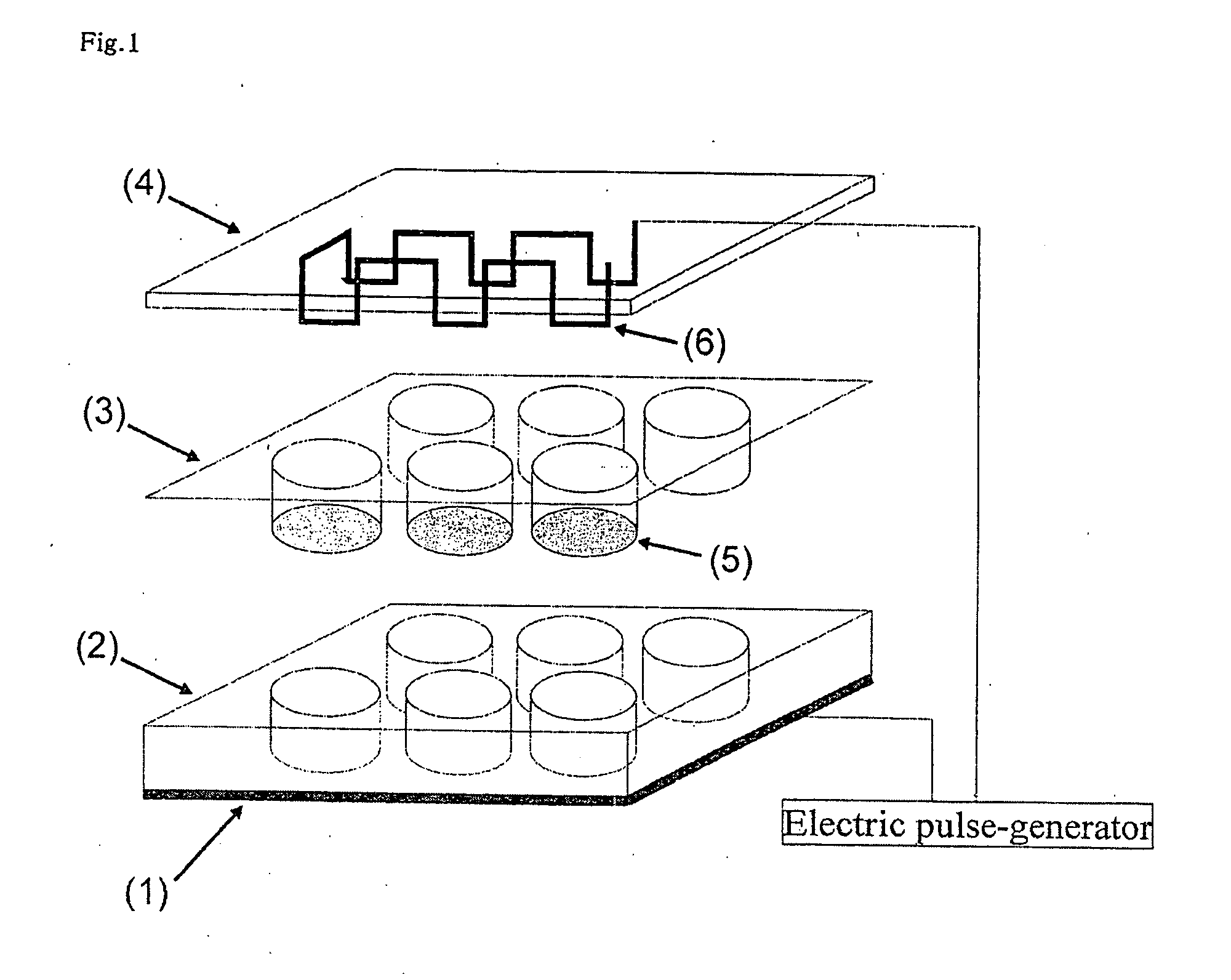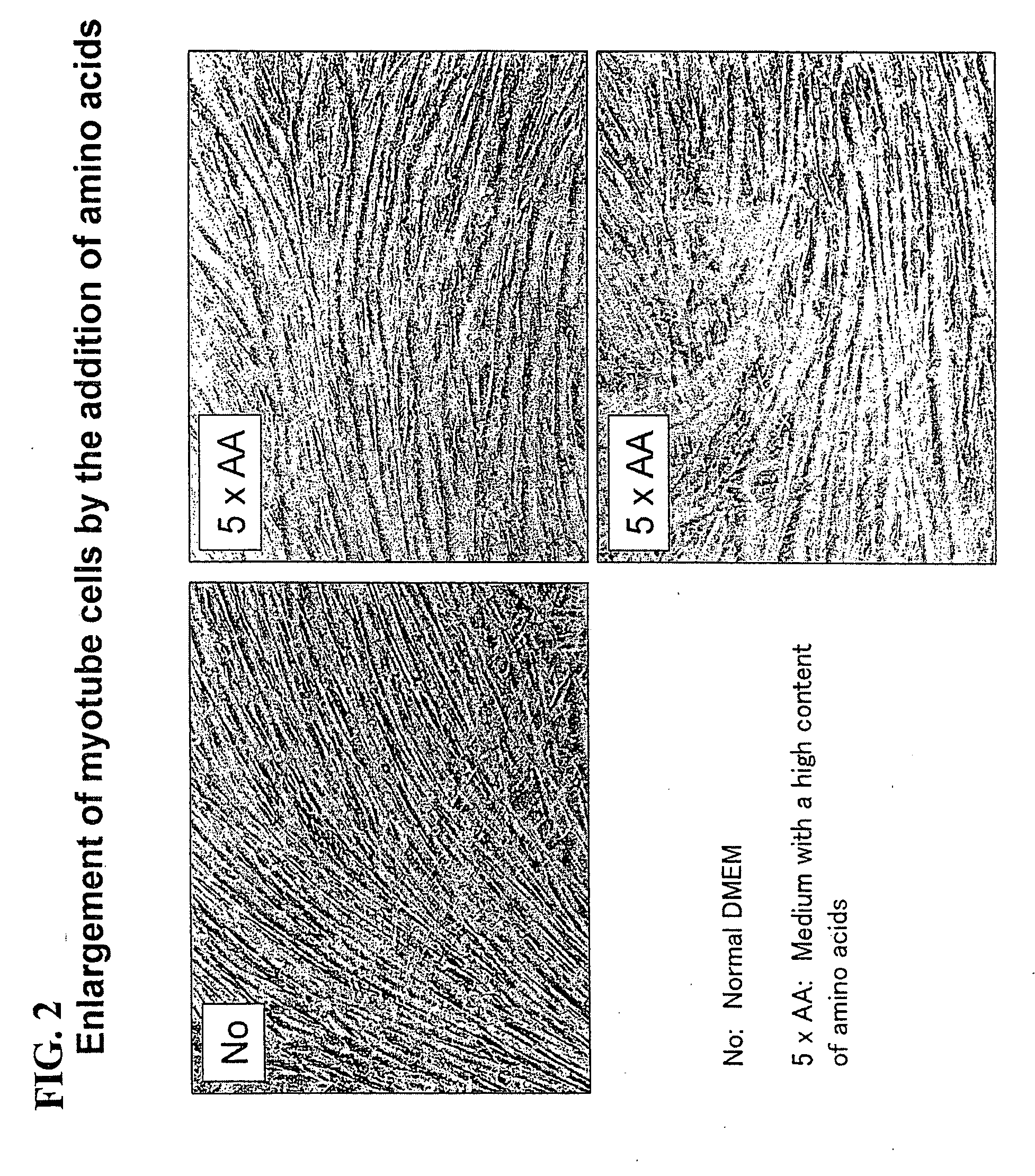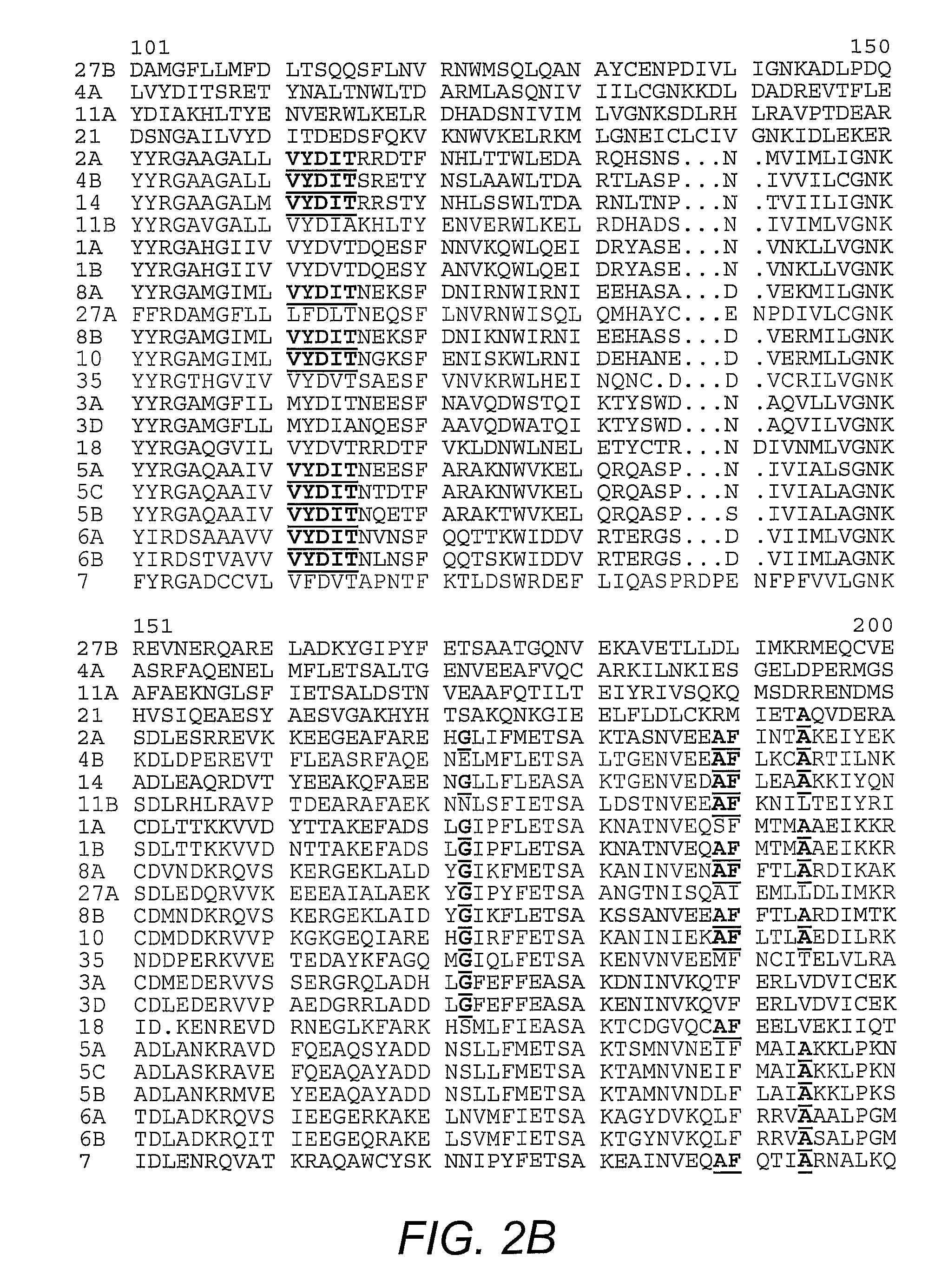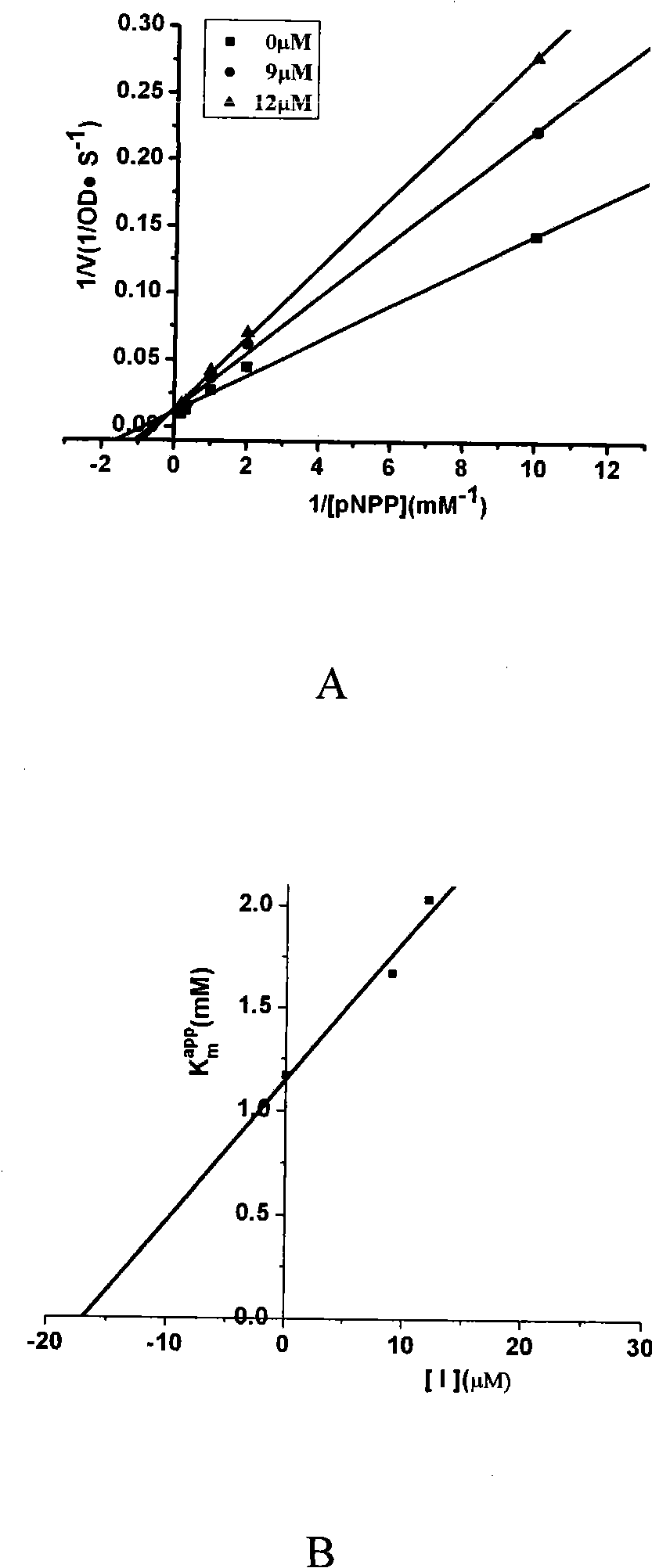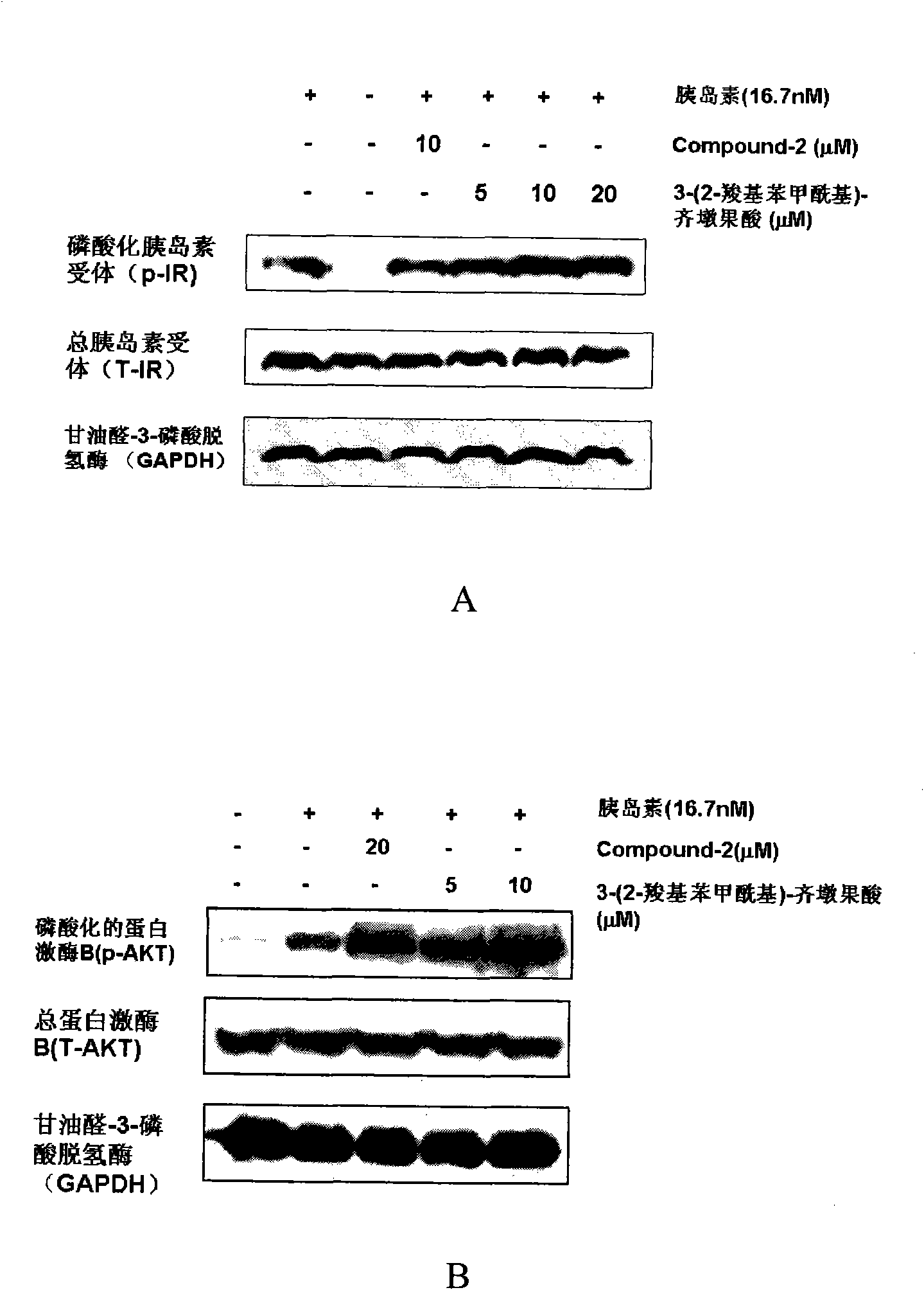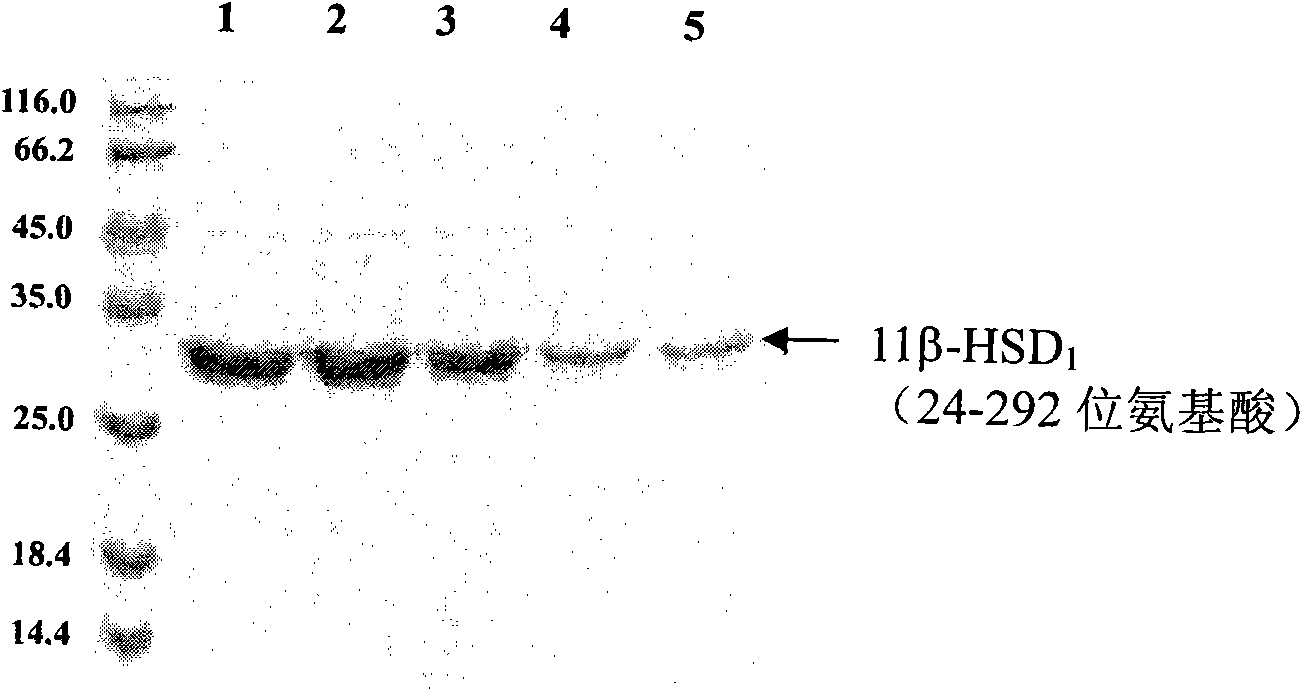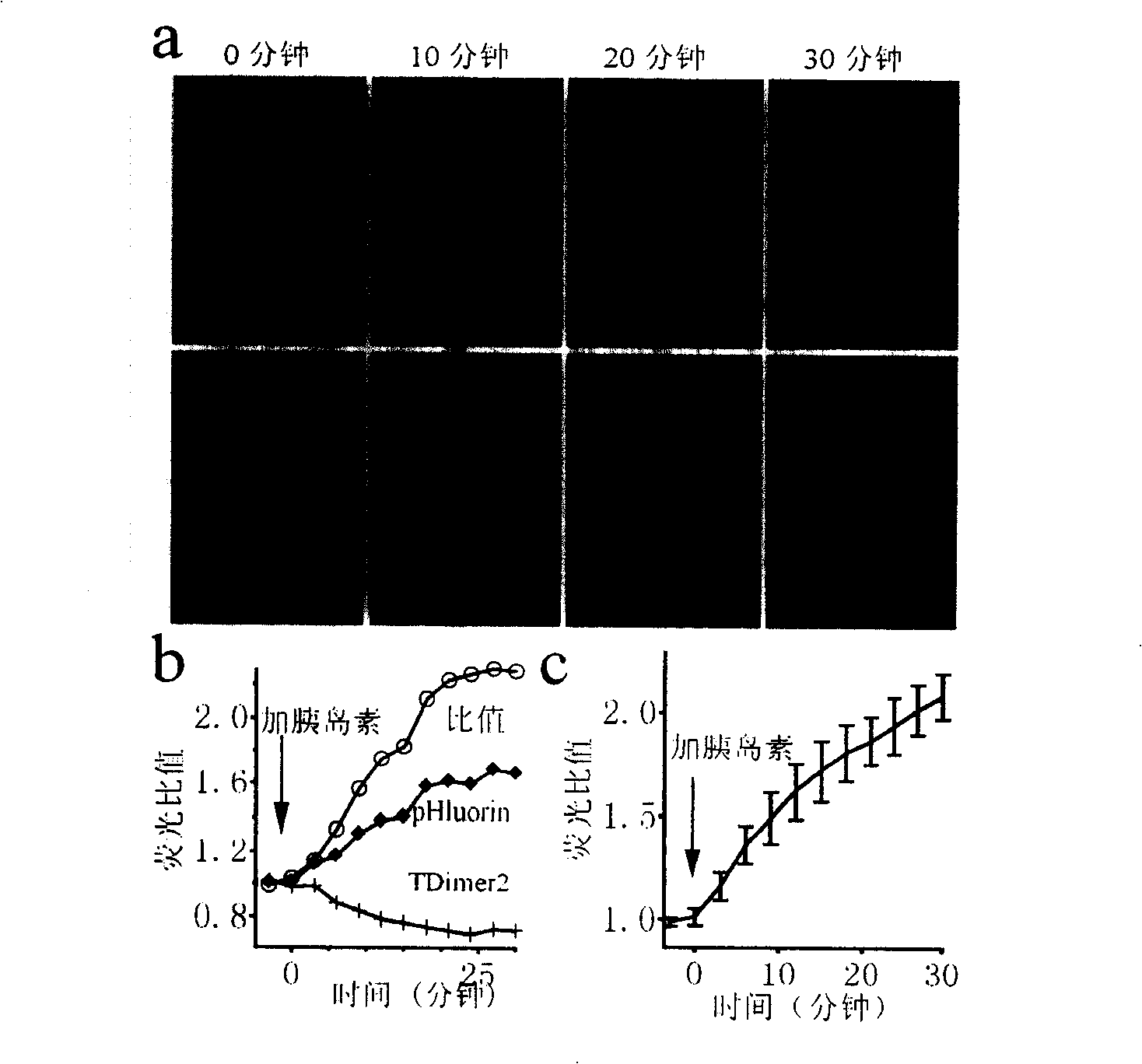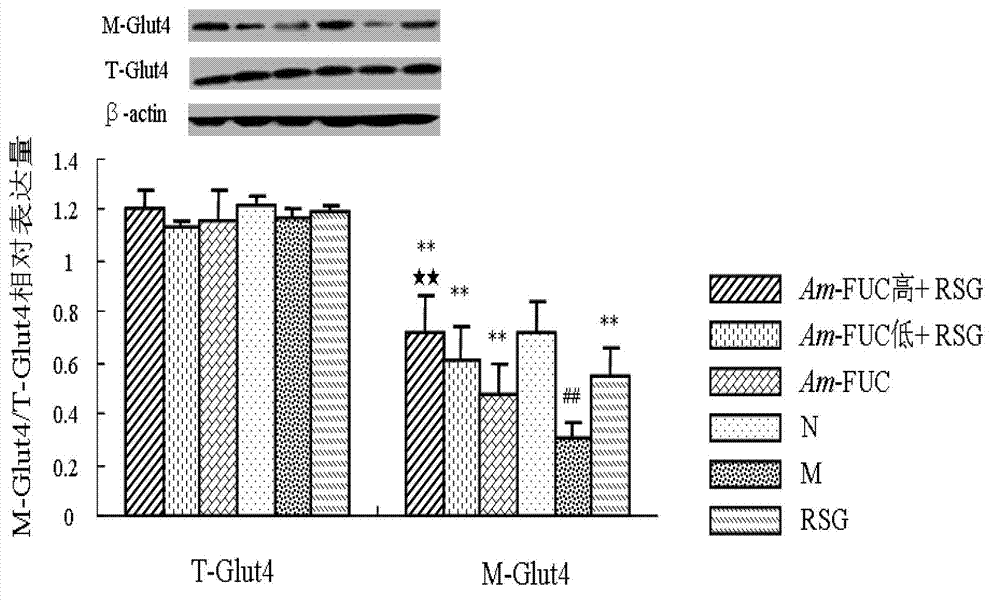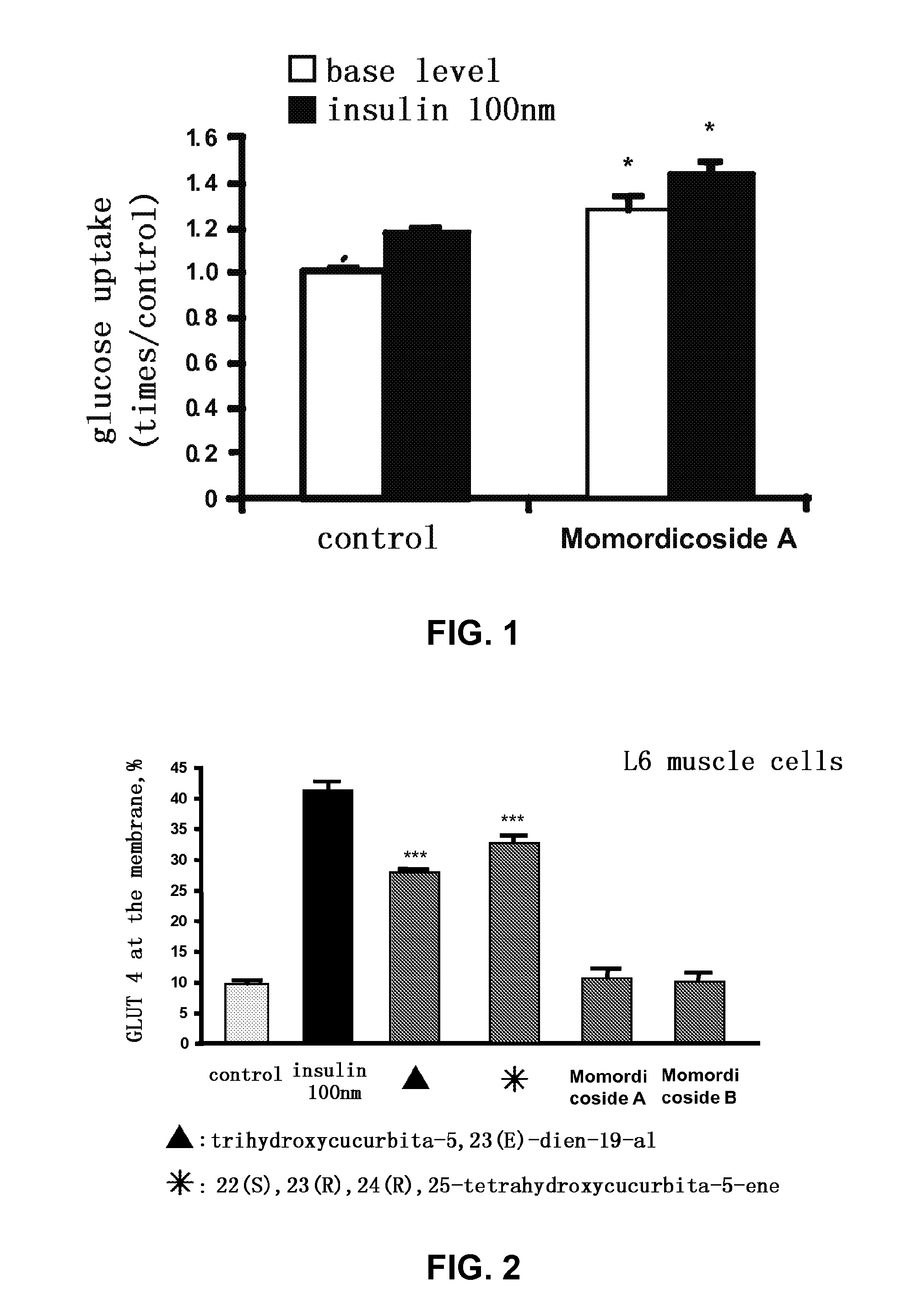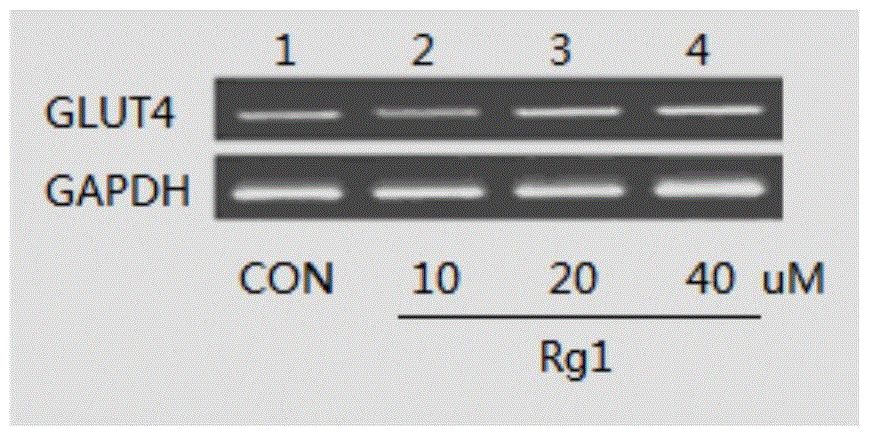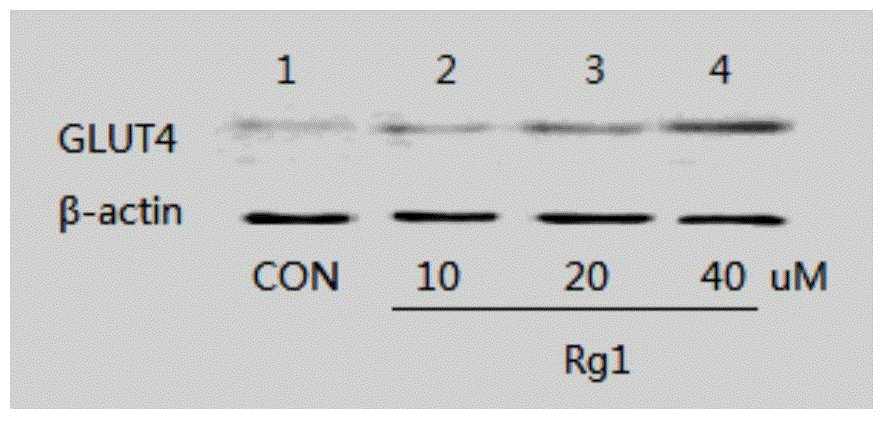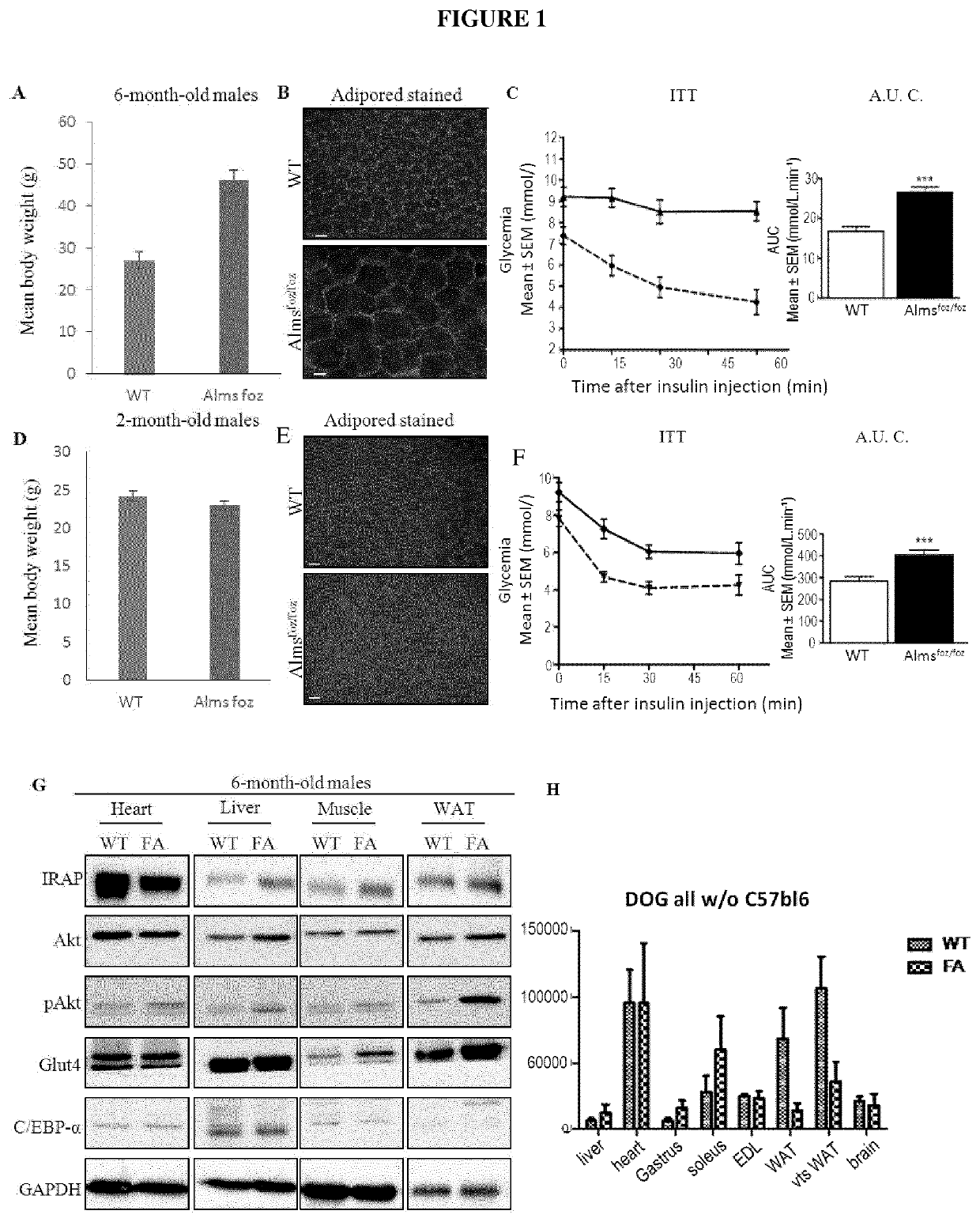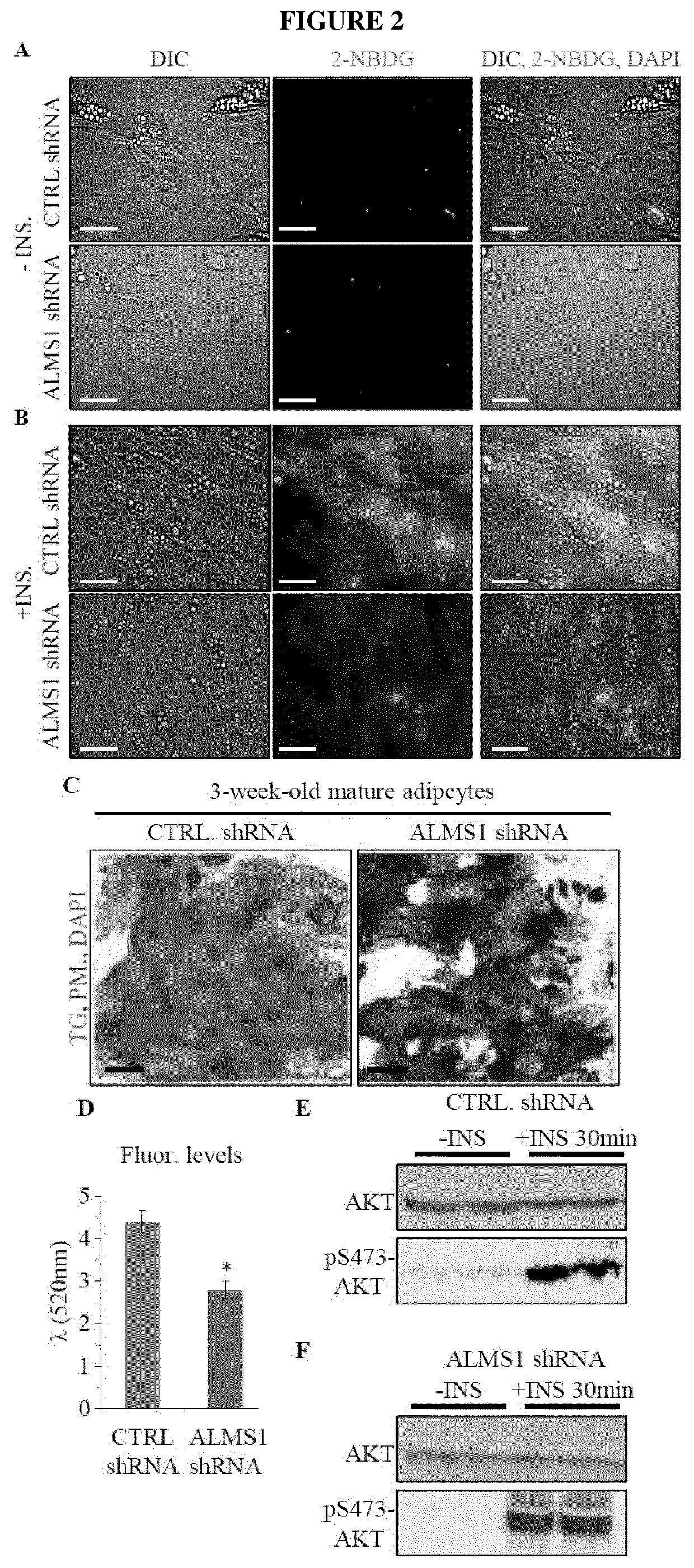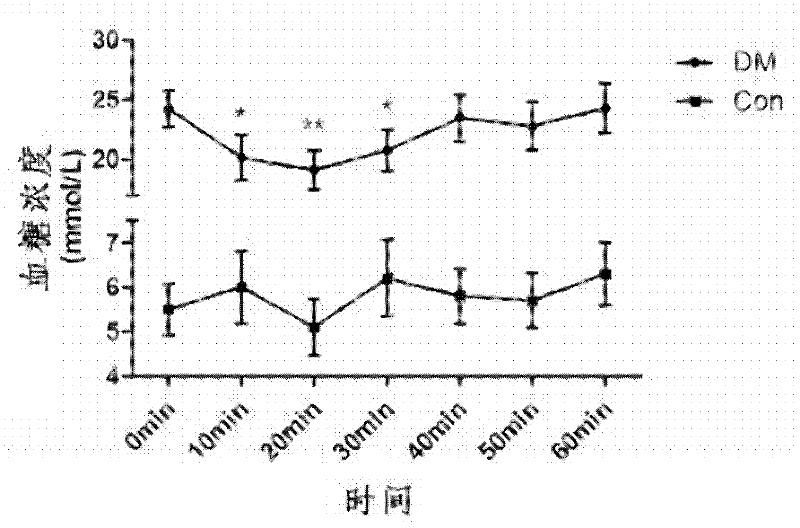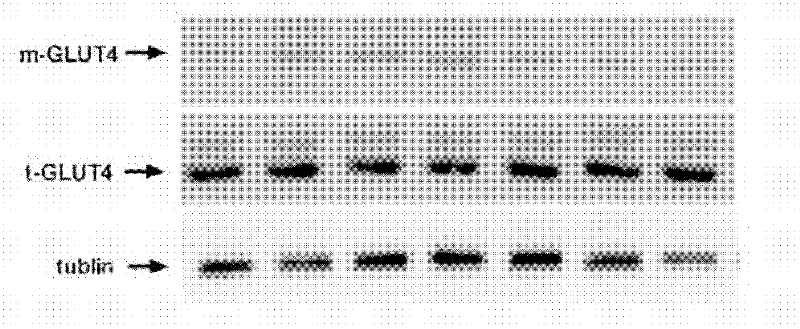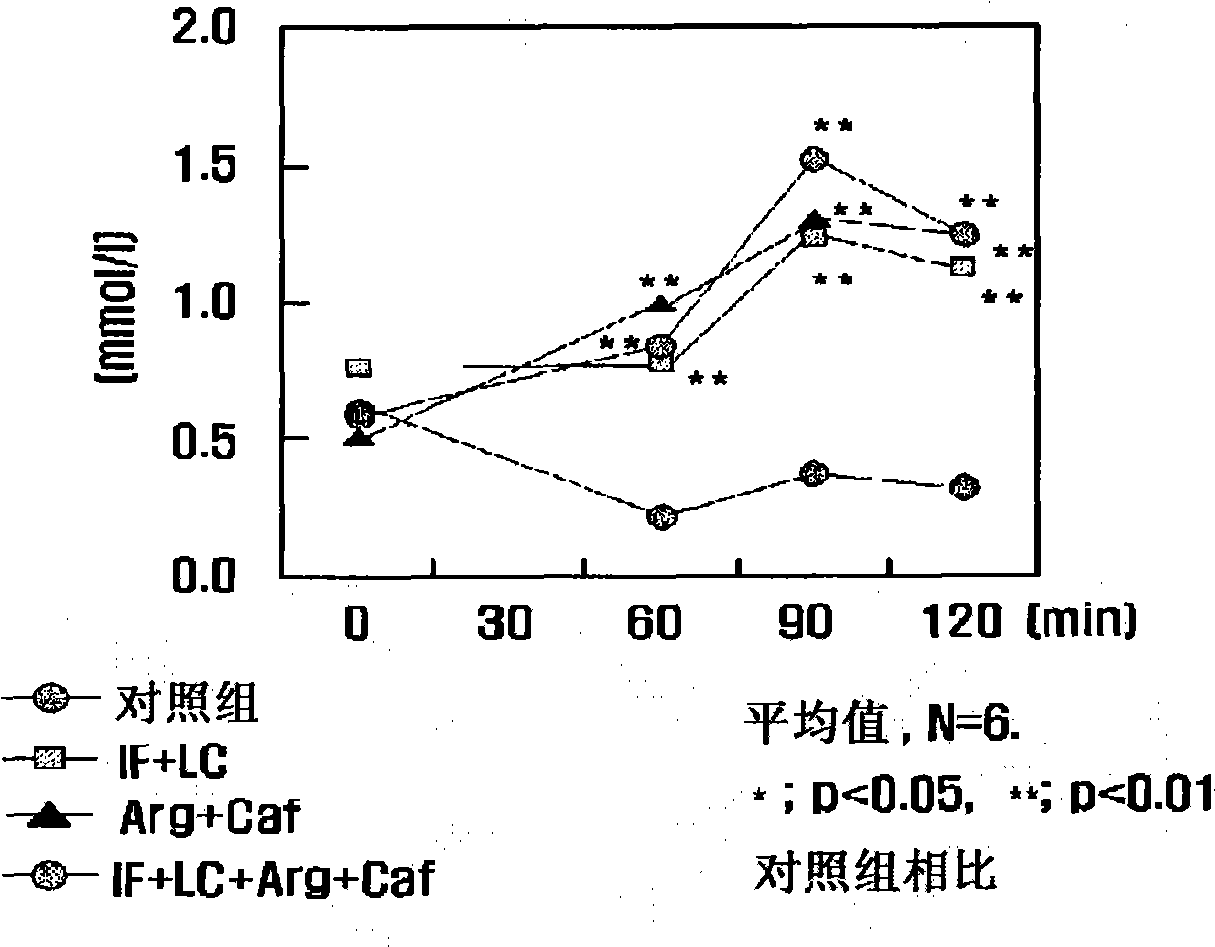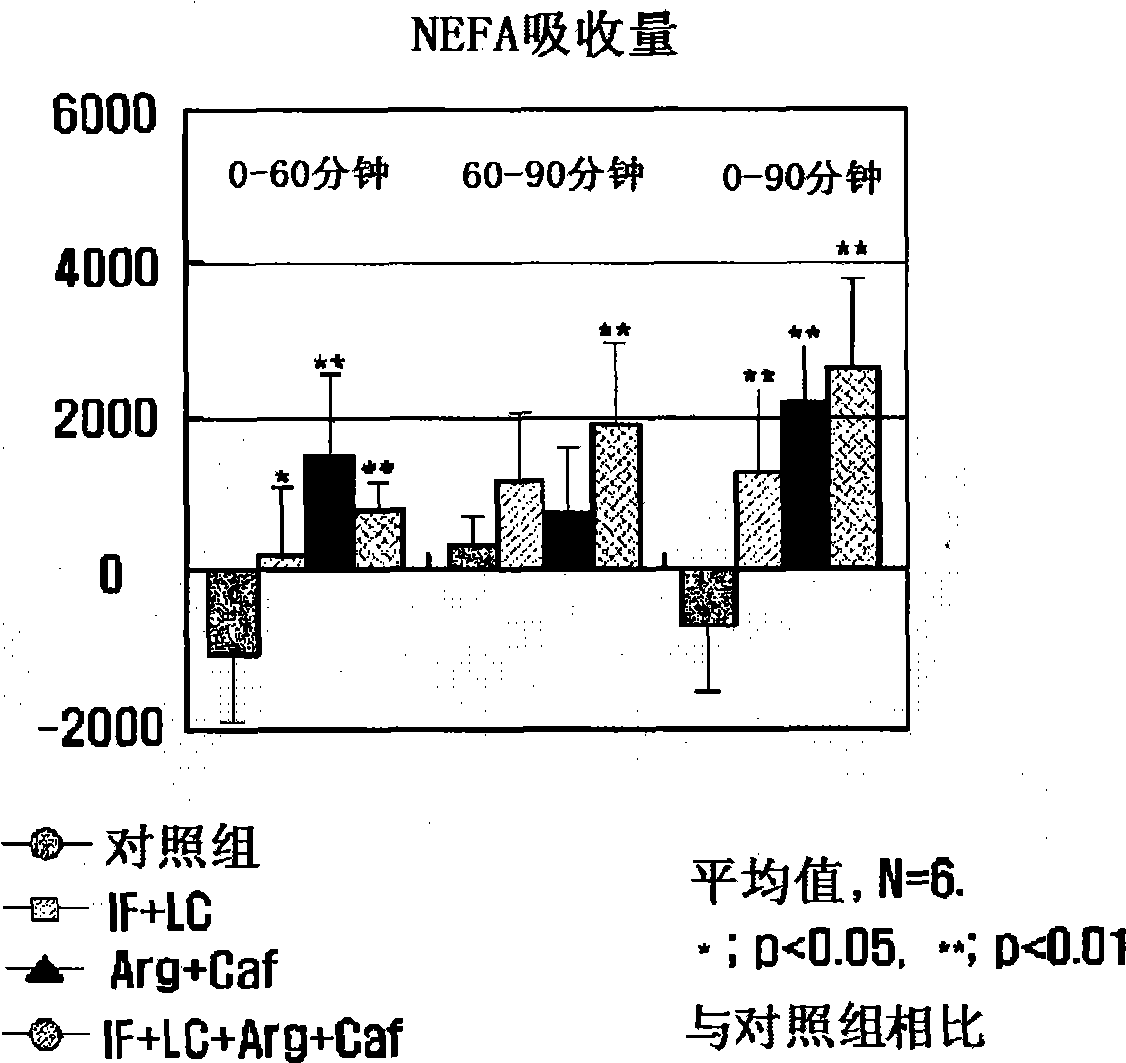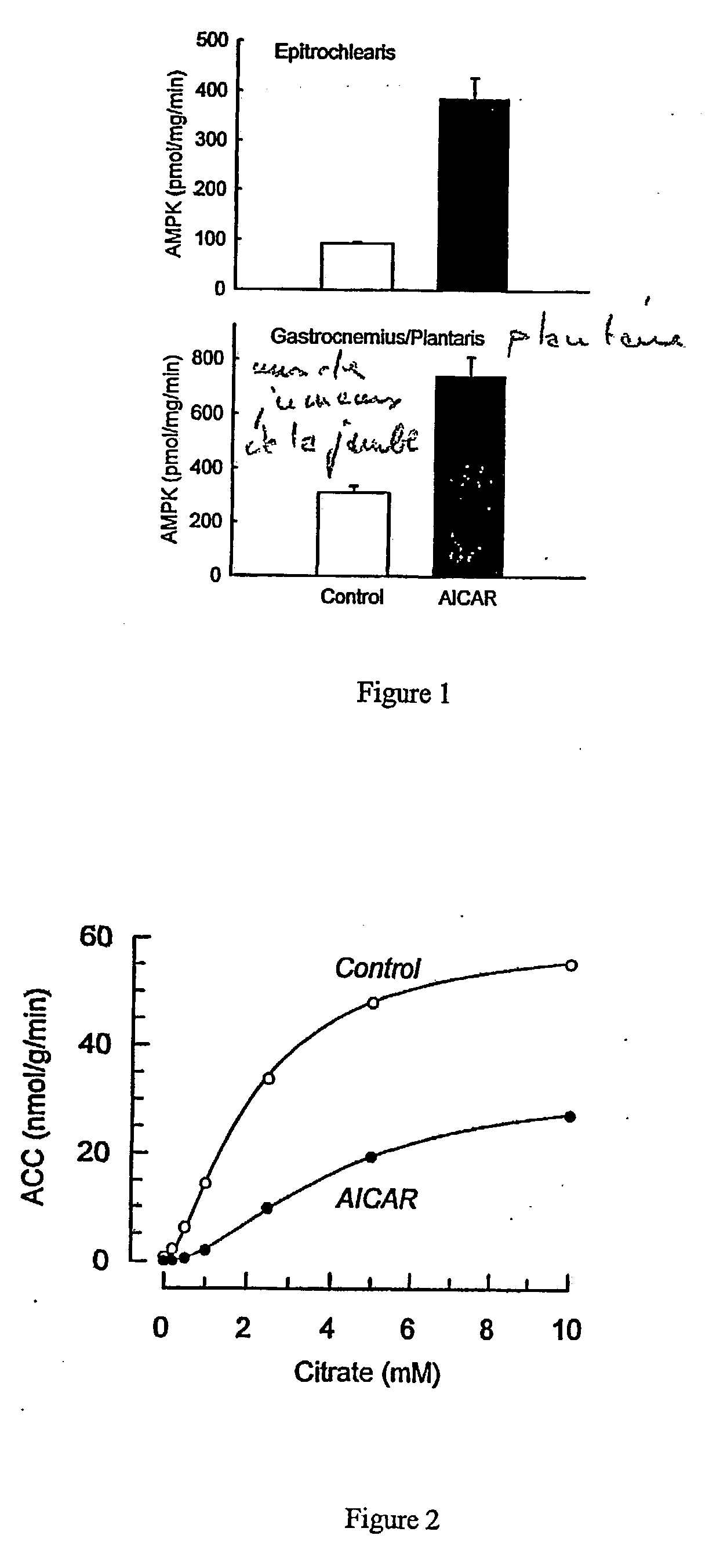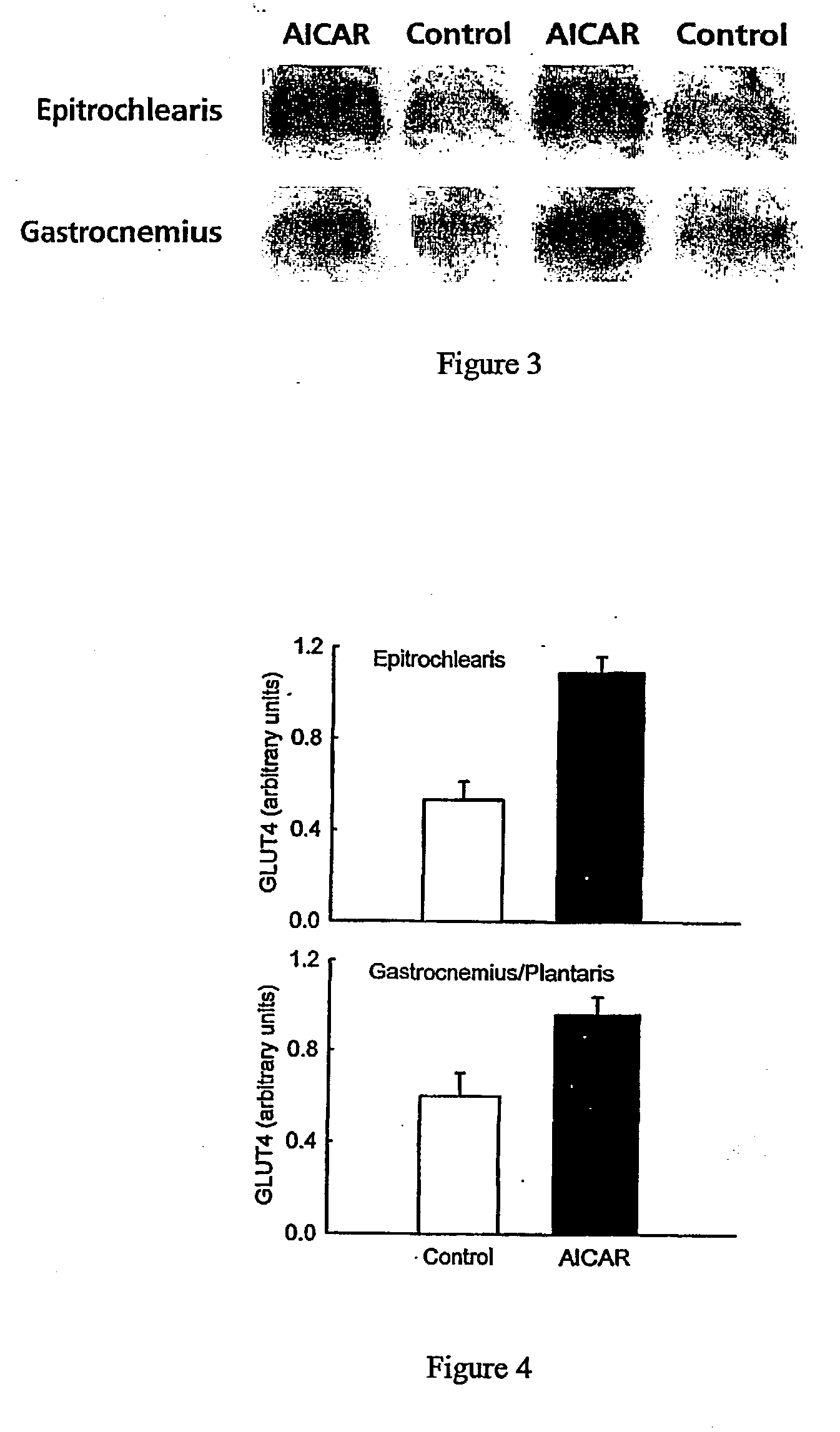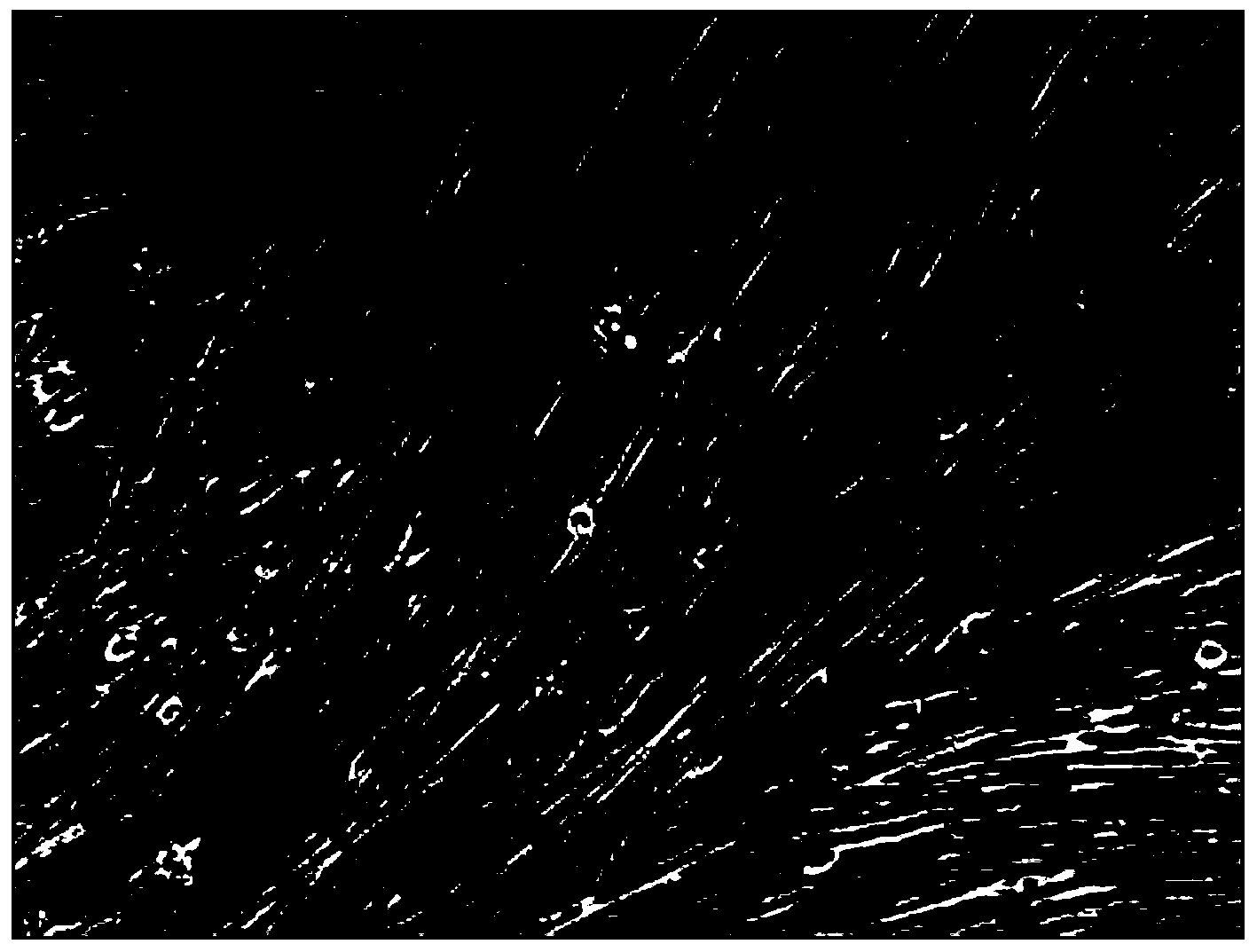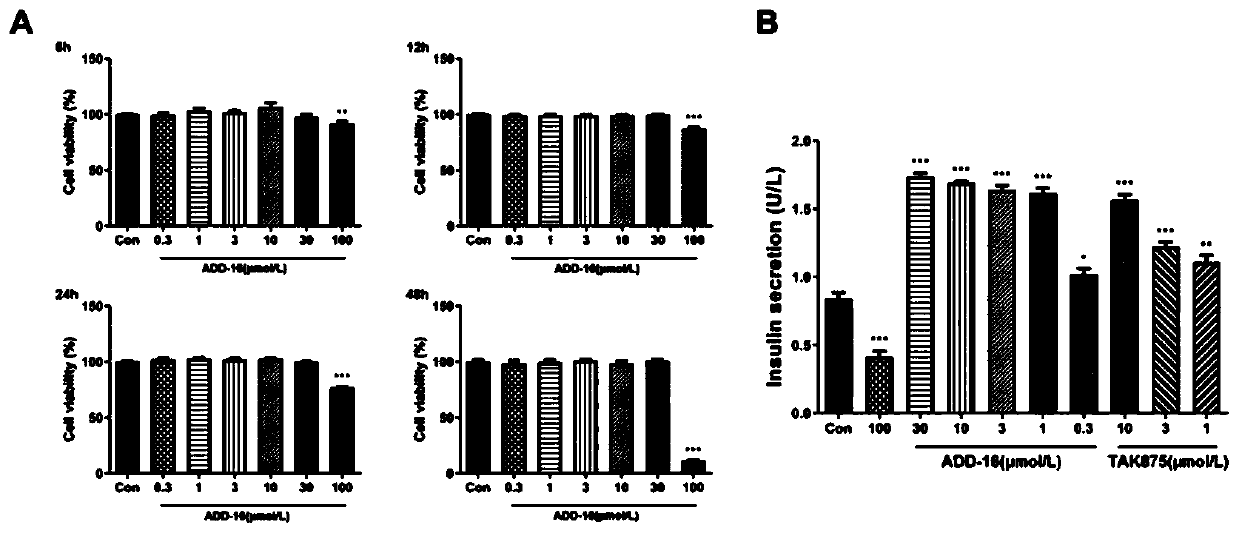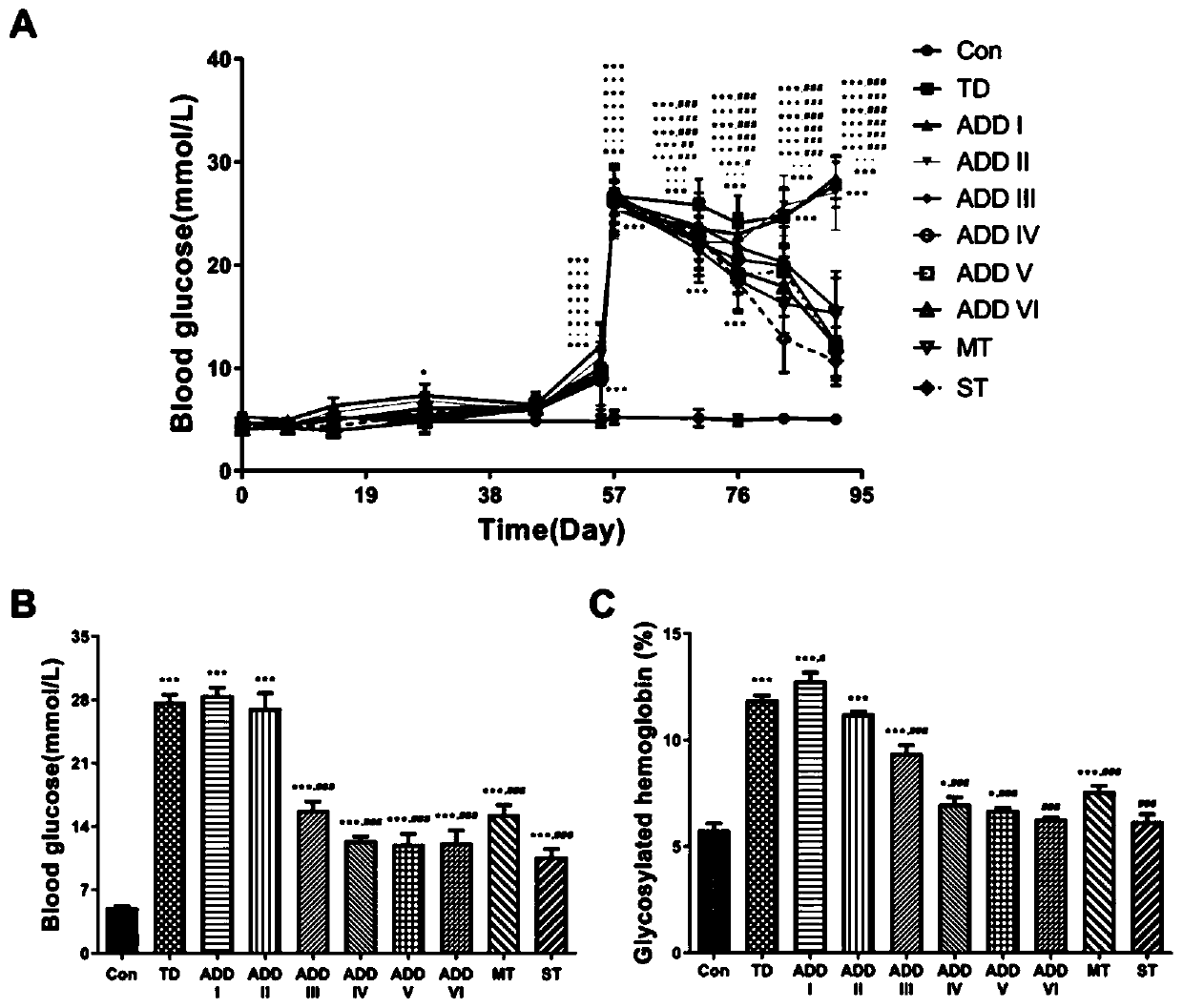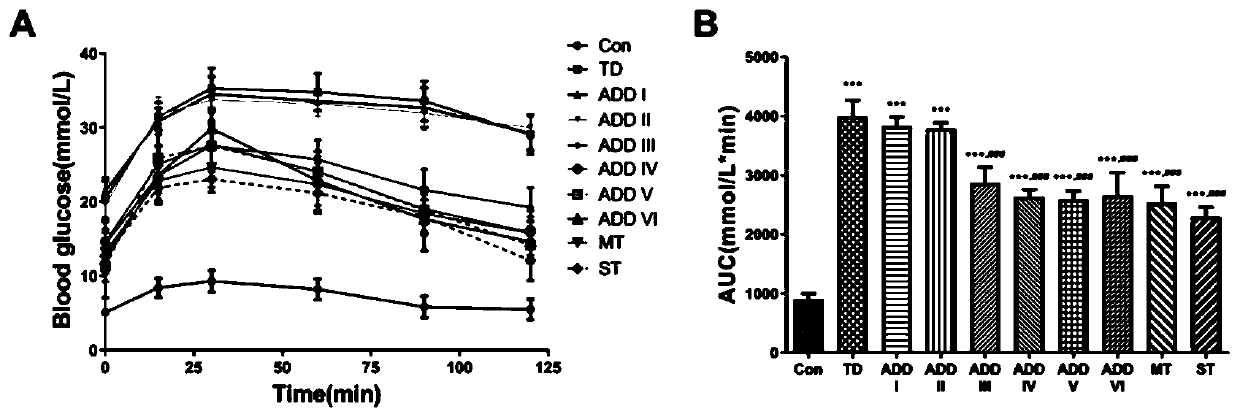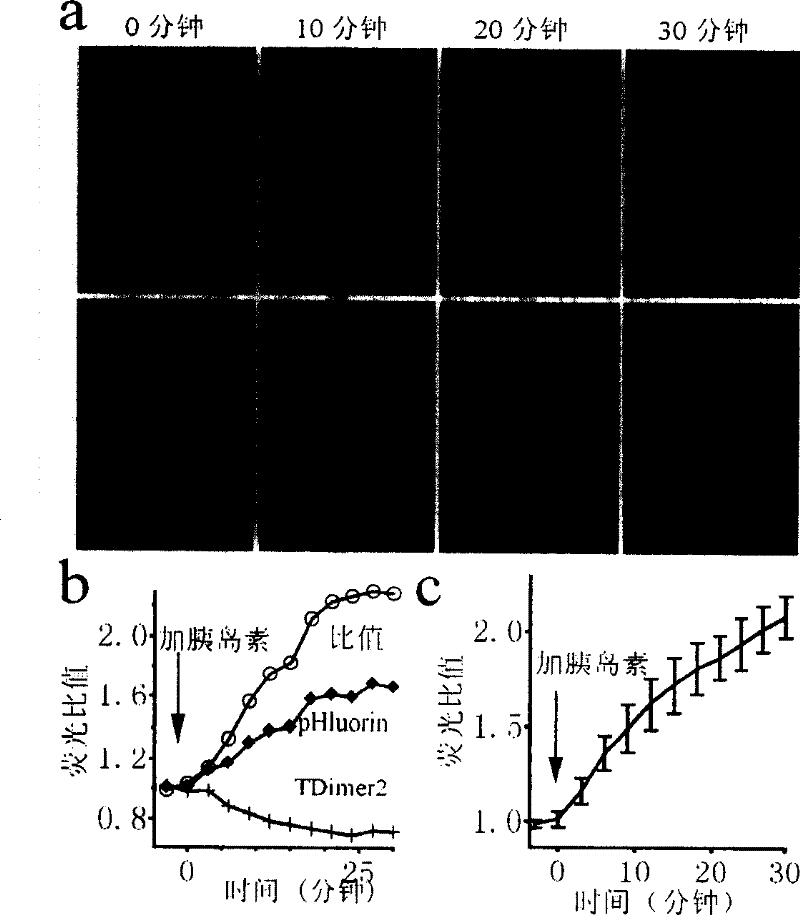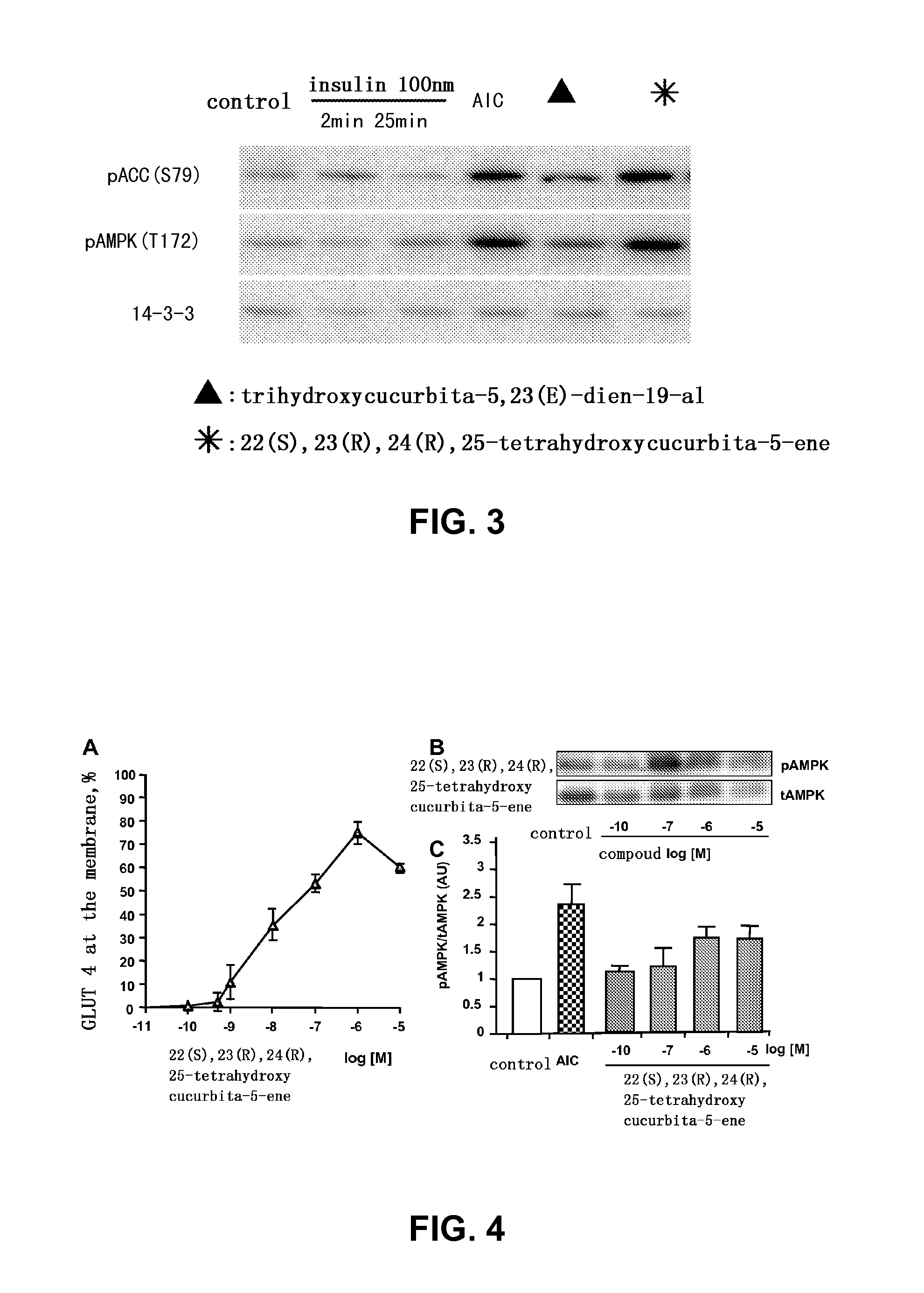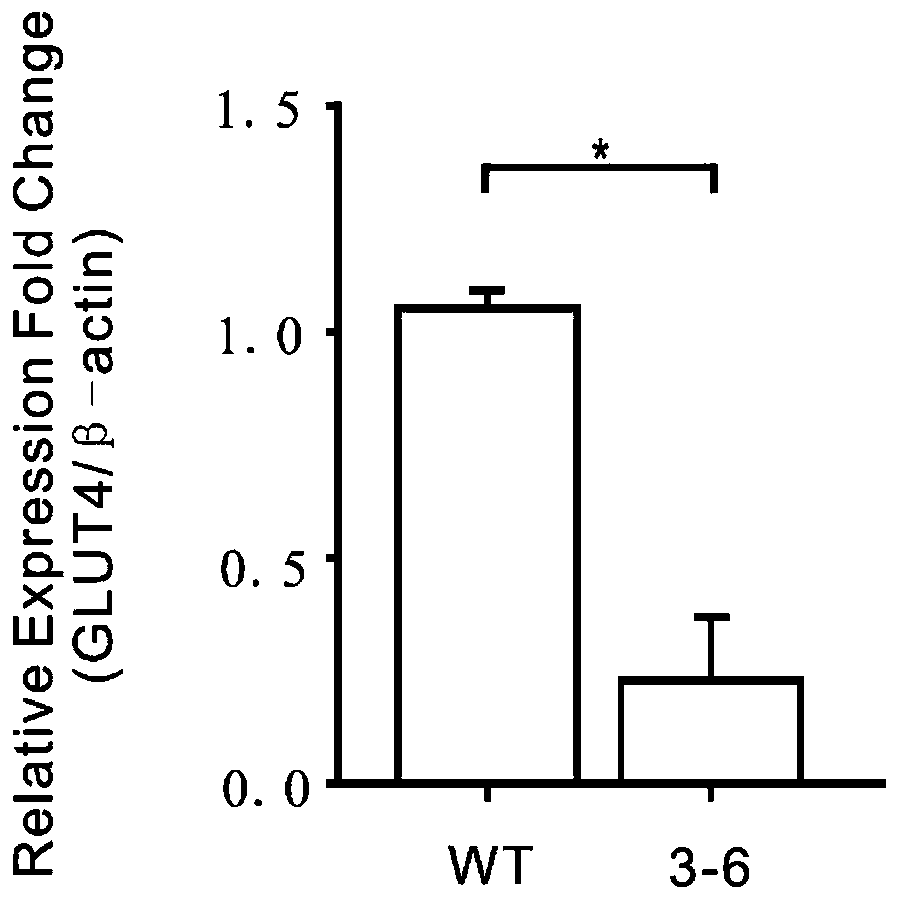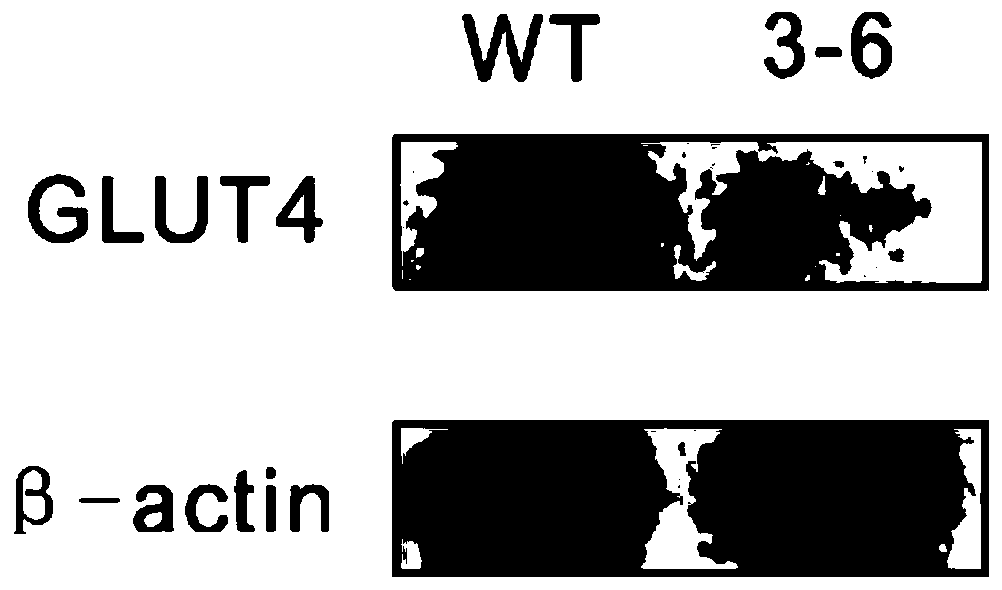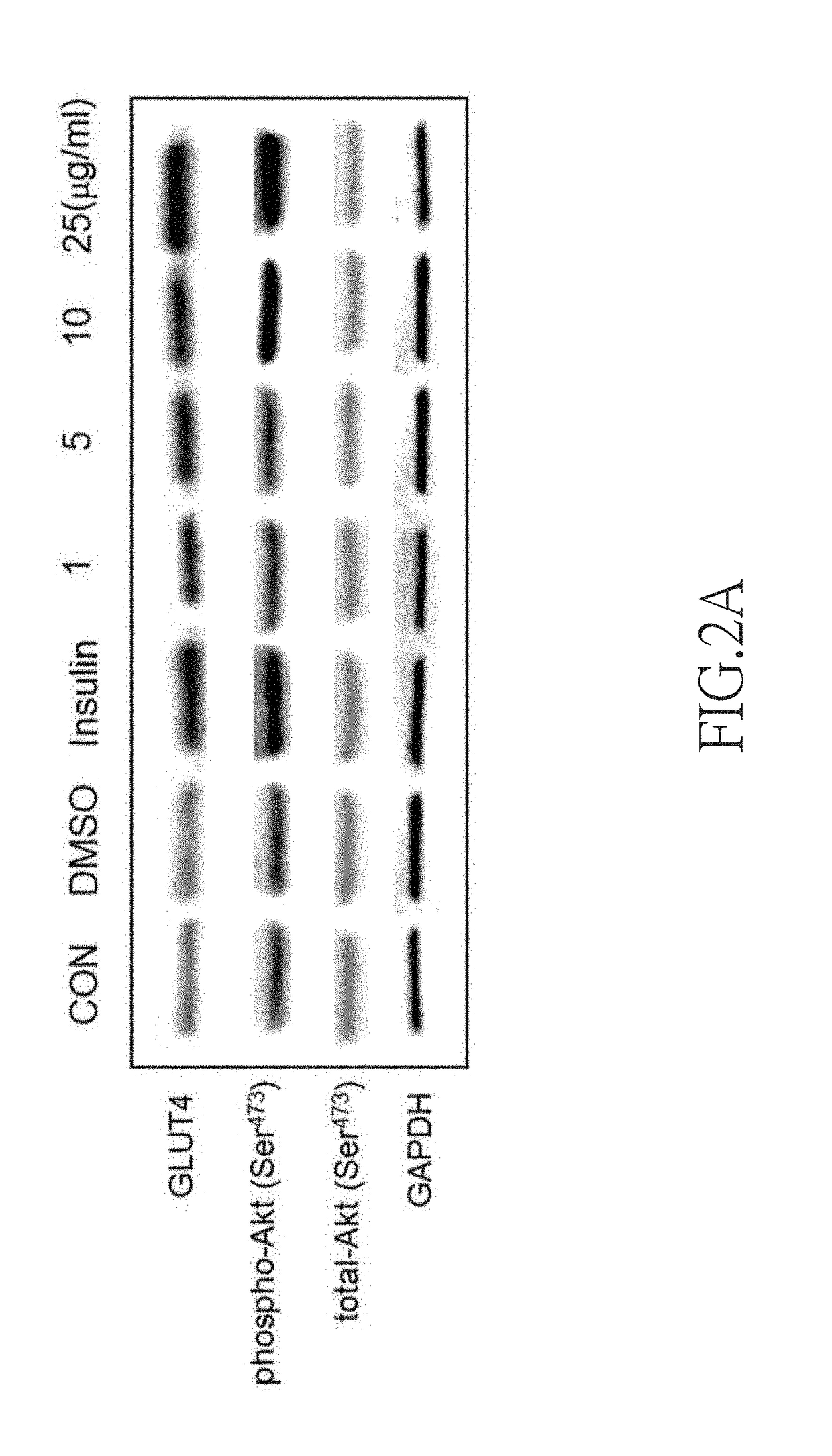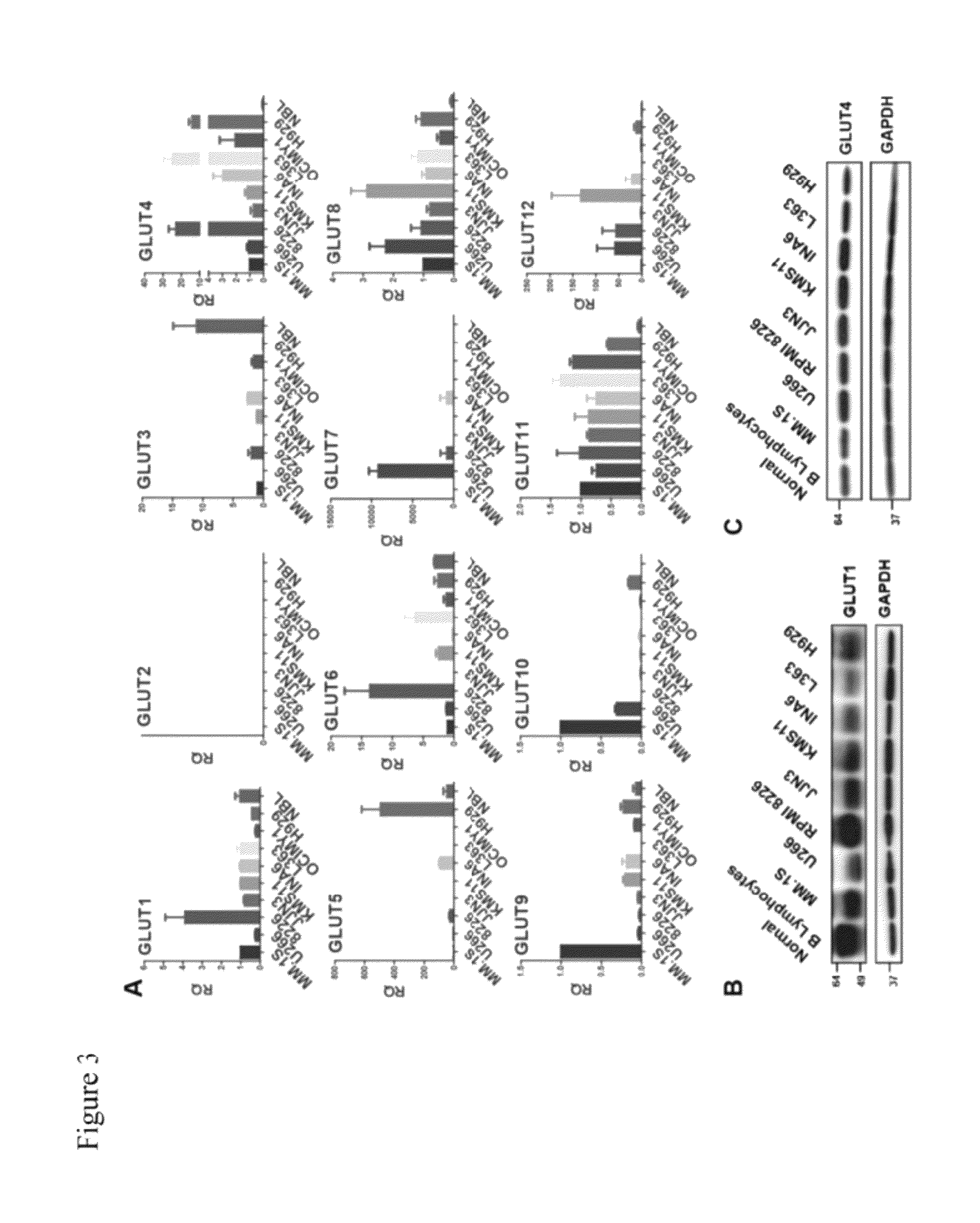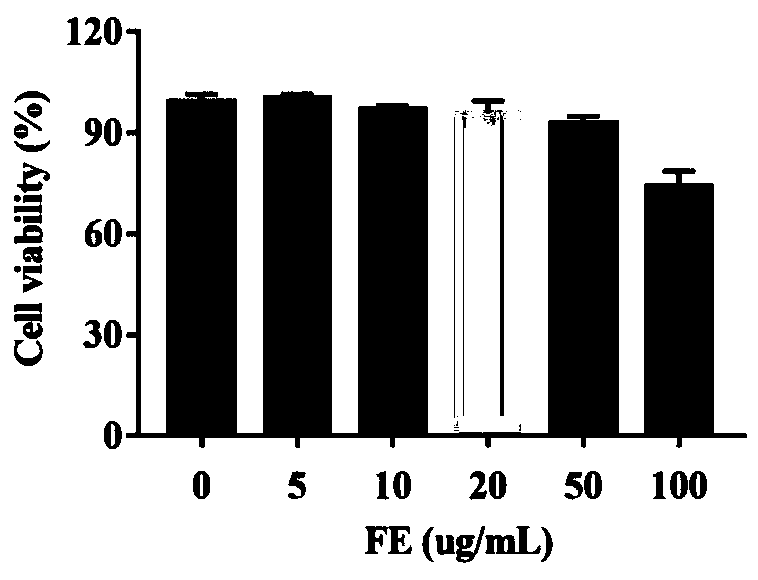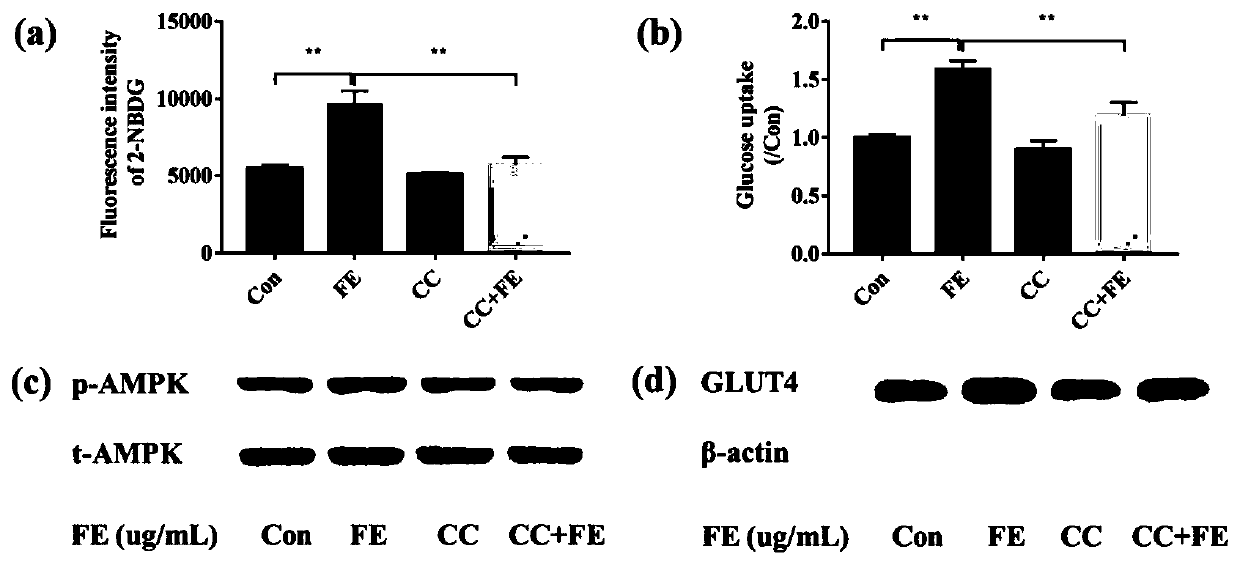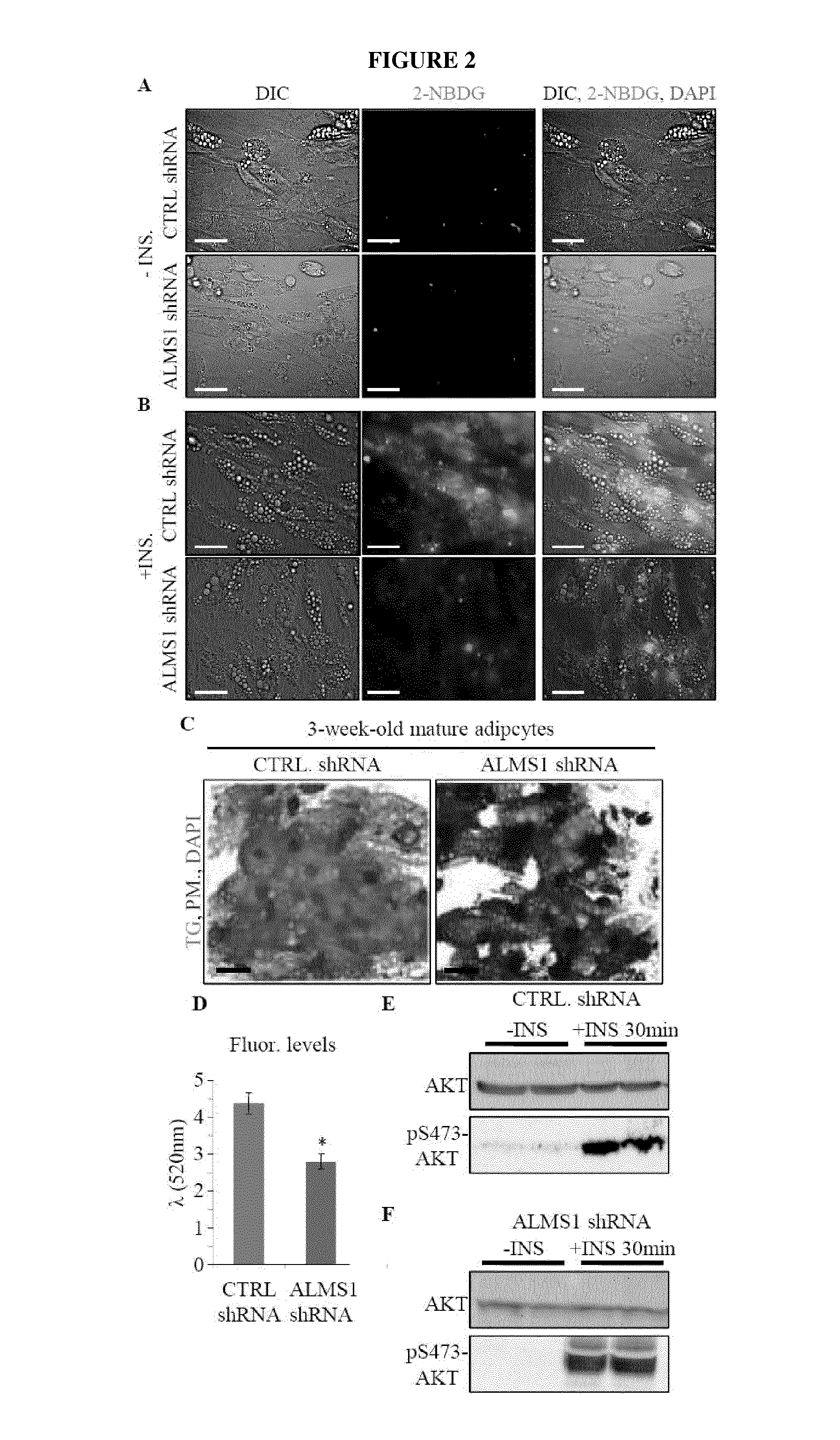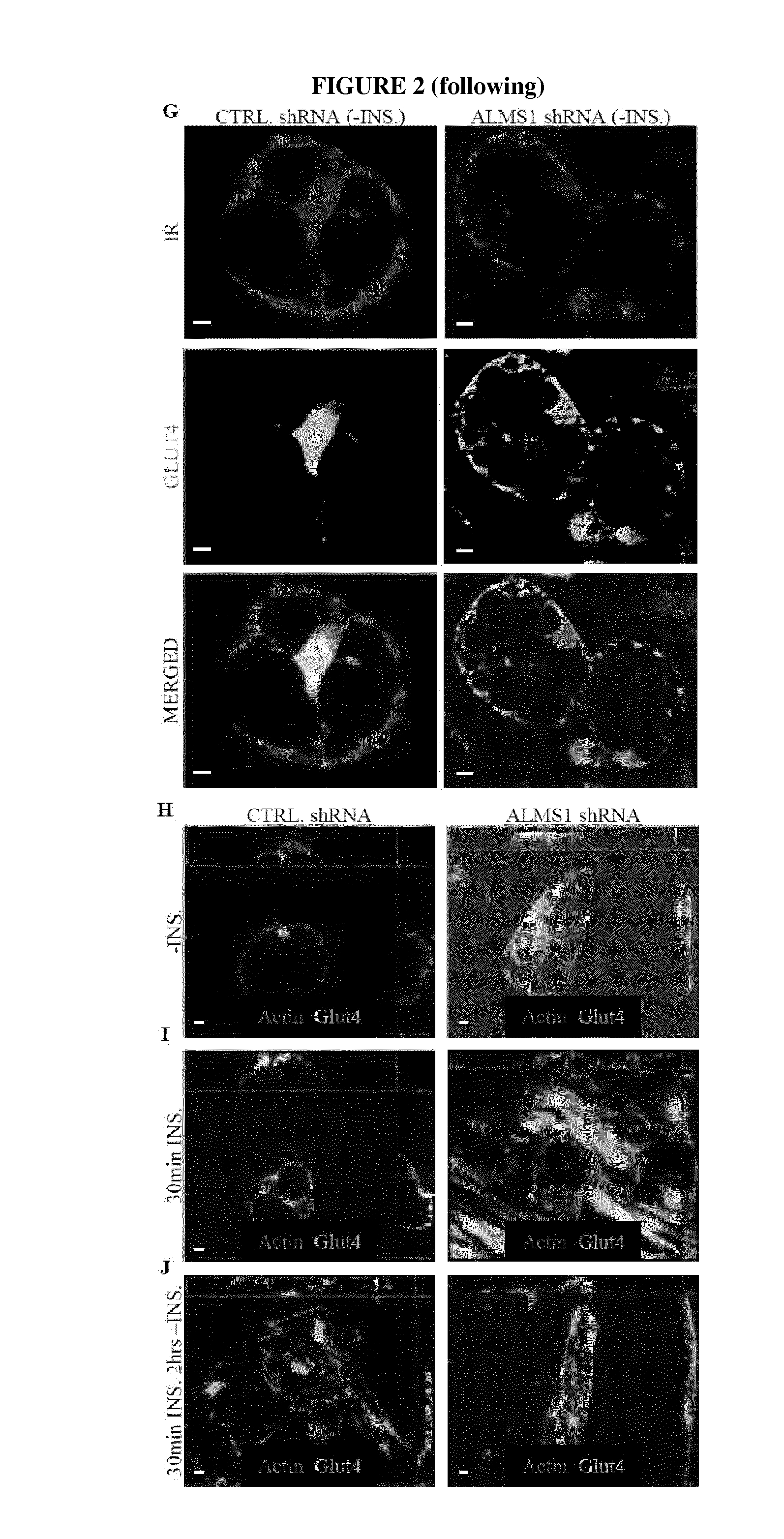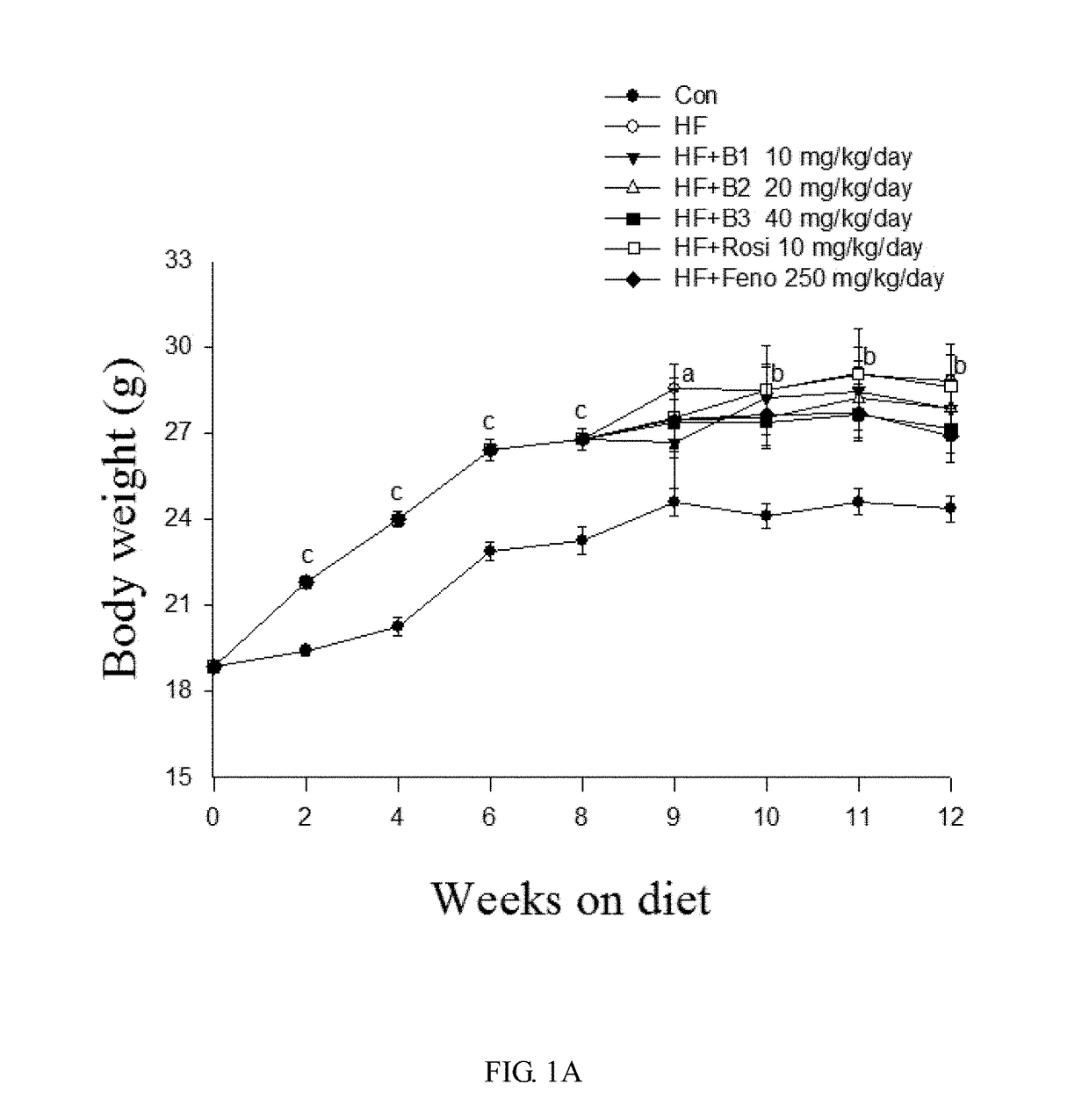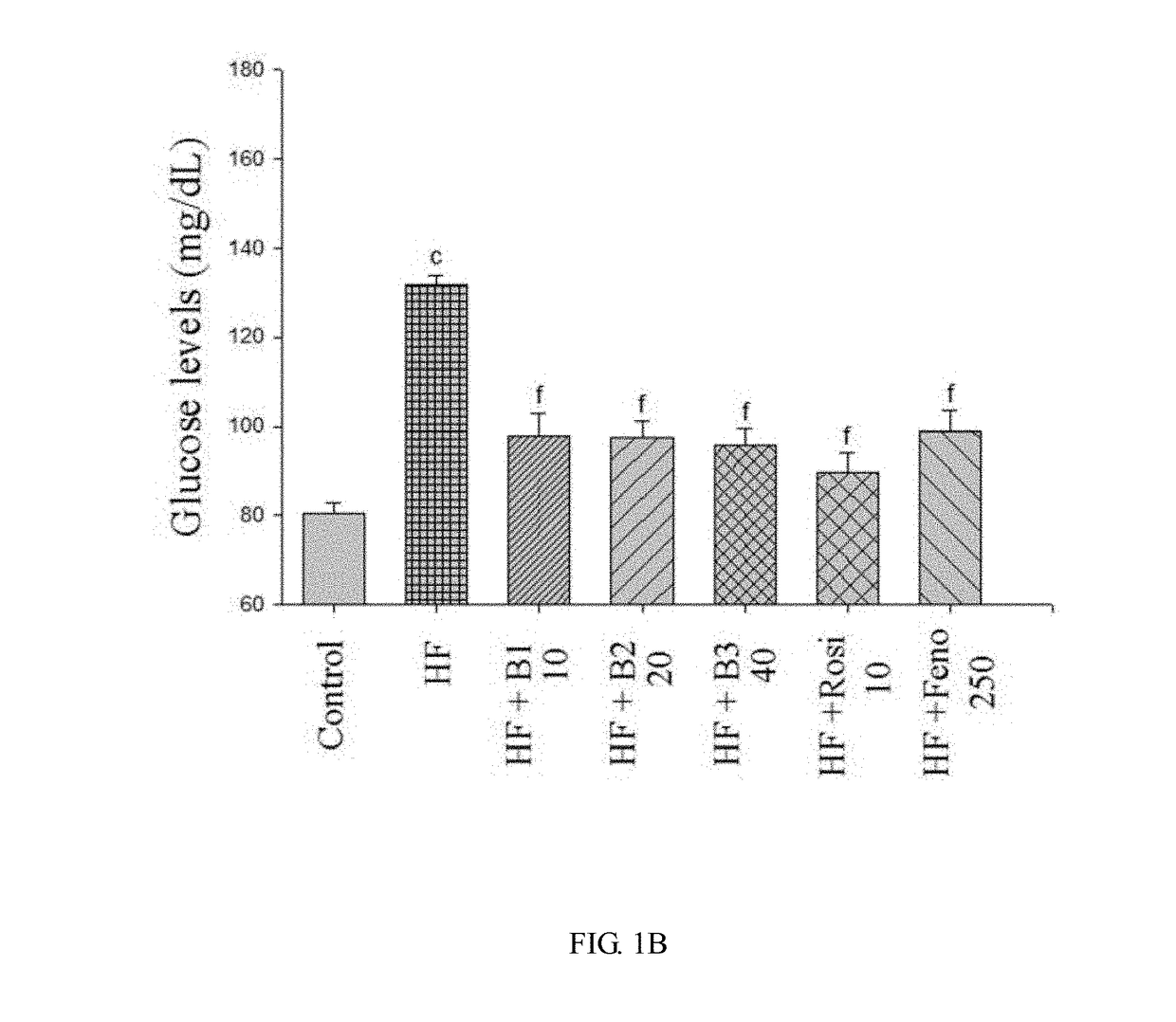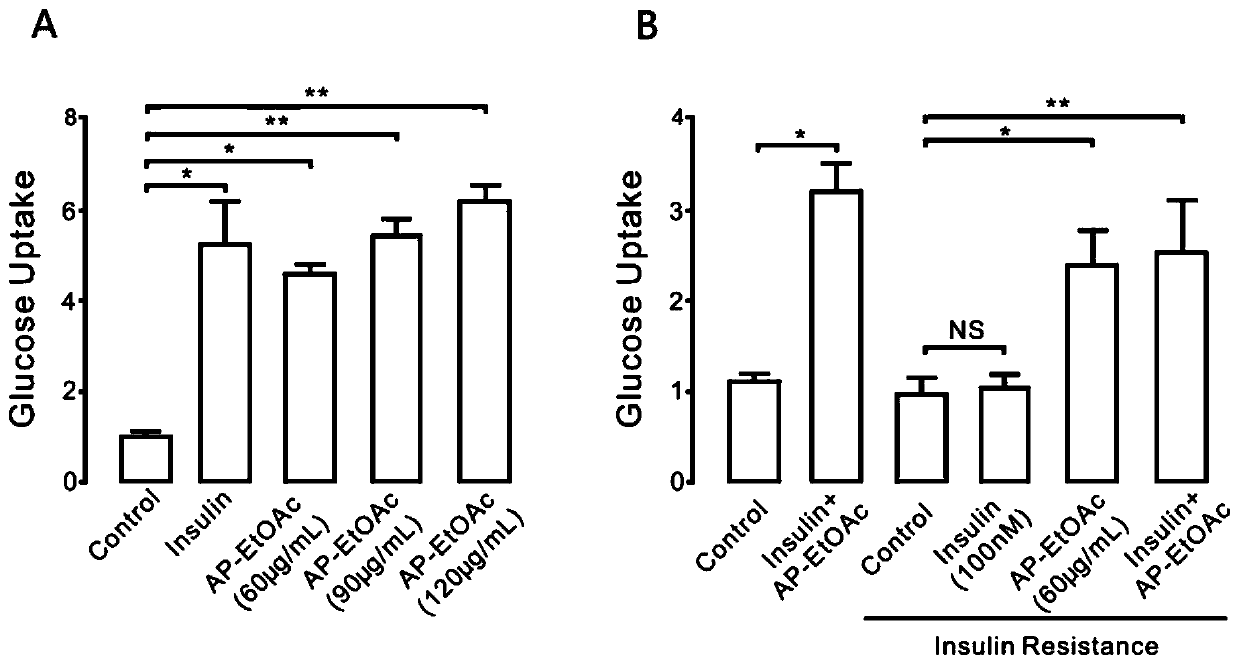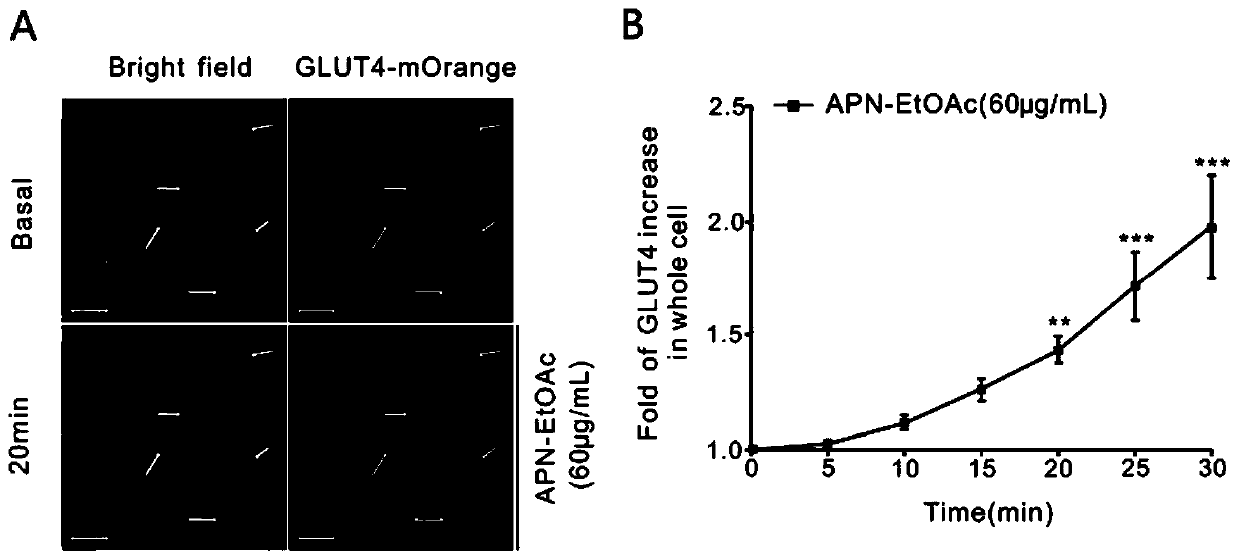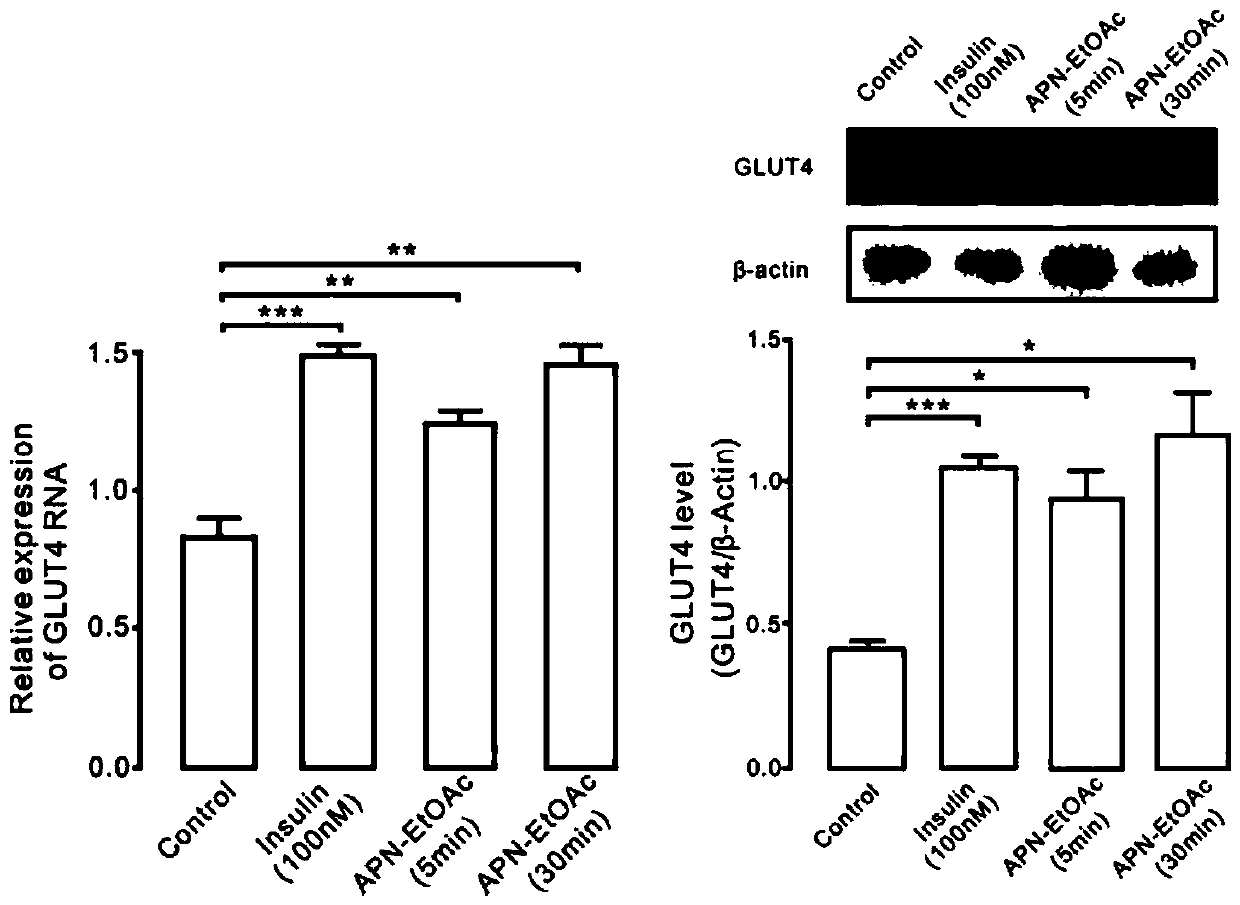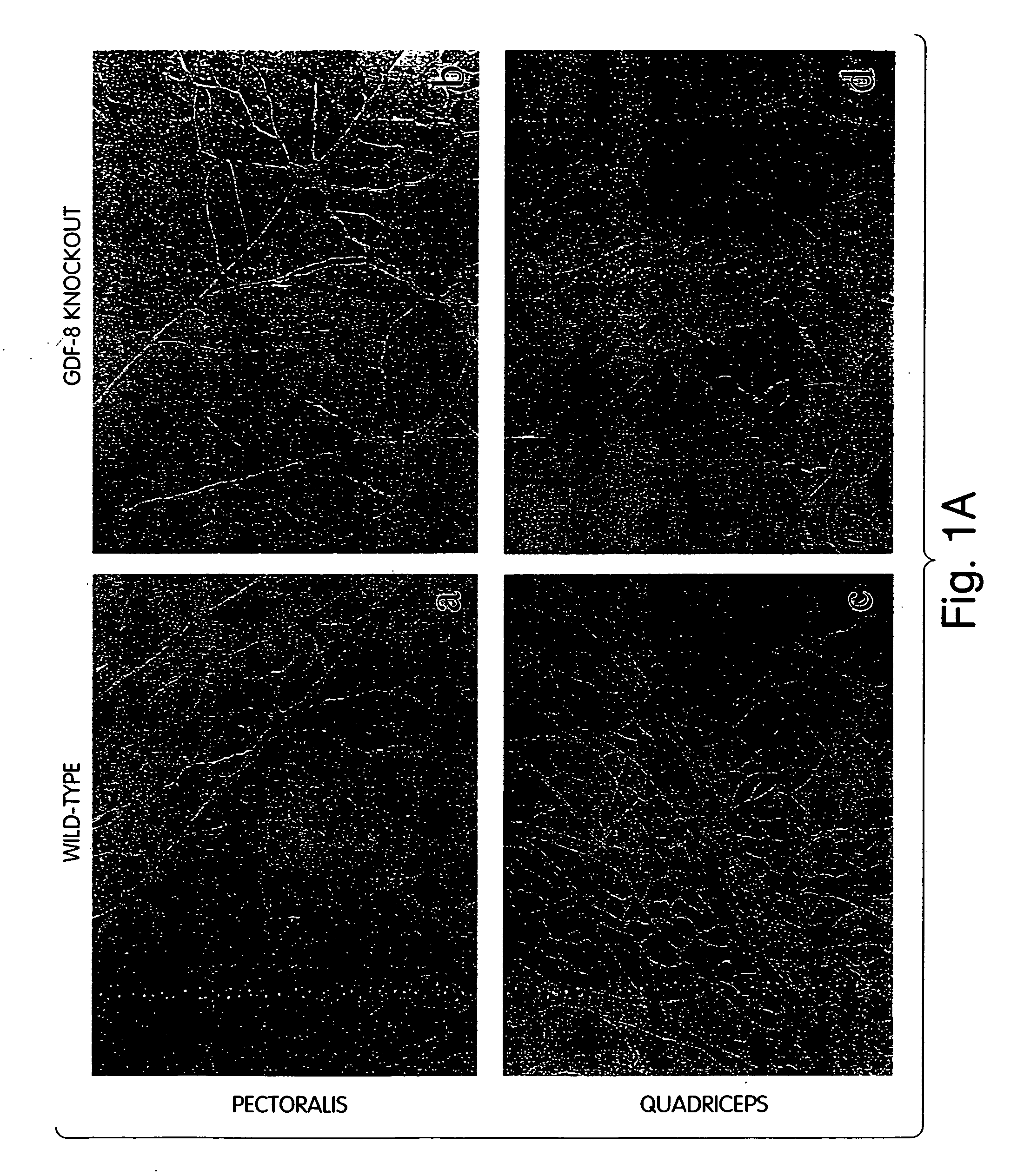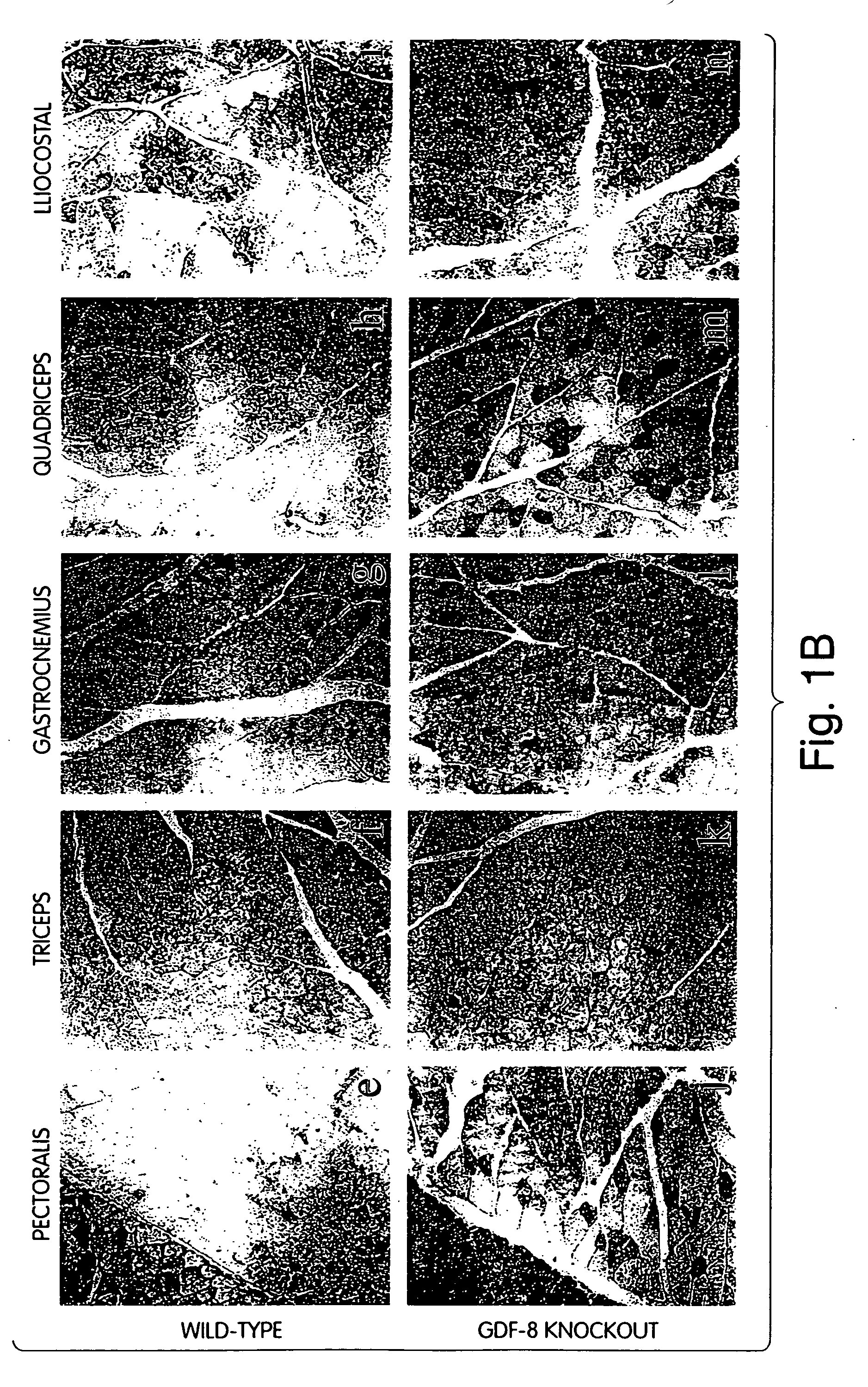Patents
Literature
Hiro is an intelligent assistant for R&D personnel, combined with Patent DNA, to facilitate innovative research.
62 results about "GLUT4" patented technology
Efficacy Topic
Property
Owner
Technical Advancement
Application Domain
Technology Topic
Technology Field Word
Patent Country/Region
Patent Type
Patent Status
Application Year
Inventor
Glucose transporter type 4 (GLUT-4), also known as solute carrier family 2, facilitated glucose transporter member 4, is a protein encoded, in humans, by the SLC2A4 gene. GLUT4 is the insulin-regulated glucose transporter found primarily in adipose tissues and striated muscle (skeletal and cardiac). The first evidence for this distinct glucose transport protein was provided by David James in 1988. The gene that encodes GLUT4 was cloned and mapped in 1989.
Methods for the upregulation of glut4 via modulation of PPAR delta in adipose tissue and for the treatment of disease
The present invention is directed to novel compositions and their application as pharmaceuticals for the treatment of disease. Methods of upregulation of GLUT4 via activation of peroxisome proliferator activated receptor delta activity in the adipose tissue of a human or animal subject are also provided, for the treatment of conditions such as diabetes, obesity, insulin resistance, metabolic syndrome, and others in which a reduction in insulin resistance, an increase in glucose utilization, a reduction in visceral fat, a reduction in triglyceride (TG) levels, or an increase in levels of high-density lipoprotein (HDL), is beneficial.
Owner:KALYPSYS INC
Cultured muscle cells with high metabolic activity and method for production of the cultured muscle cells
InactiveUS20080299086A1Improve glucose metabolismSimple structureBiocideBioreactor/fermenter combinationsMyogenic cellInsulin dependent
The object of the present invention is to provide a method of preparing excellent cultured muscle cells having high metabolic capacity and insulin responsiveness, and further provide a method for the measurement of sensitive metabolic capacity using the cells. Moreover, its purpose is to provide a culture system / culture apparatus that can smoothly translocate such highly advanced cultured muscle cells intact to activity evaluation systems of a number of drugs. Moreover, the object of the present invention is to provide cultured muscle cells that are very suitable for measurement of the membrane-translocation activity of GLUT4 in an extraneous stimulus-dependent manner such as insulin, etc., and to provide a method for the measurement of the membrane-translocation activity of GLUT4 using the cells. The present invention is a method of preparing myotube cells, comprising a step (1) of culturing myoblast cells, a step (2) of differentiation-inducing the myotube cells into the myoblast cells in a culture medium with a high content of amino acids, and a step (3) of applying an electric pulse to the differentiation-induced myotube cells, and a method for the measurement of insulin-dependent sugar uptake using the myotube cells prepared by said method, and relates to the method for the measurement, comprising applying insulin stimulation by culturing the cells in a culture medium containing insulin, culturing the cells in the culture medium further supplemented with sugar, and measuring the sugar uptake. Furthermore, the present invention relates to a differentiation-type culture myotube cell constitutively expressing a recombinant GLUT4 having a labeled substance at its extra-cellular site, which is prepared by co-culturing wild-type myoblast cells and recombinant myoblast cells constitutively expressing said recombinant GLUT4, and a method for the measurement of membrane-translocation activity of the recombinant GLUT4 using the cells, and particularly a method for the measurement of insulin-dependent sugar uptake activity.
Owner:TOHOKU UNIV
Method for identifying agents which modulate GTPase activity involved in insulin-stimulated GLUT4 translocation
The present invention is a method for identifying agents that modulate the GTPase activity of AS160. In the instant assay, AS160 or the GAP domain thereof is contacted with a test agent, in the presence of GTP-bound Rab (2A, 8A, 8B, 10, or 14), and the AS160 GAP domain-mediated hydrolysis of GTP to GDP is monitored.
Owner:TRUSTEES OF DARTMOUTH COLLEGE THE
3-(2-carboxylbenzoyl)-oleanolic acid, pharmaceutical composition of same and application of same in treating diabetes and/or obesity
InactiveCN101525366AEasy to synthesizeEasy to manufactureOrganic active ingredientsMetabolism disorderDiseaseWHOLE ANIMAL
Owner:SHANGHAI INST OF MATERIA MEDICA CHINESE ACAD OF SCI
Treatment and Prevention of Diabetes and Obesity
ActiveUS20180042287A1Vitamin food ingredientsFood ingredient functionsActive agentSignalling pathways
The invention encompasses compositions and methods for effectively treating and / or preventing diabetes and / or obesity. This is accomplished by totally addressing the multiple mechanisms that lead to such conditions. The invention includes compositions comprising a combination of agents that effectively suppress, regulate or interfere with the various biochemical processes and mechanisms that lead to diabetes and obesity. The inventive compositions used for administration to human and other mammalian subjects comprise (1) at least one agent capable of modulating expression and / or activity of one or more of peroxisome activated protein receptor gamma (PPAR-γ), CAAT / enhancer binding protein-α (C / EBPα) and Sterol Regulatory Element-Binding Protein (SREBP-1); (2) at least one agent capable of activating Wnt / β-catenin pathway; (3) at least one agent capable of activating the adenosine monophosphate-activated protein kinase (AMPK) signaling pathway; (4) at least one agent that inhibits the activity of pro-oxidants including reactive nitrogen species and reactive oxygen species (ROS); (5) at least one agent that suppresses one or more of inflammatory mediators including interleukins IL-1α, IL-1β, IL-6, NF-κB, TNF-α, matrix metalloproteinases (MMPs) and prostaglandin E2 (PGE2); (6) at least one agent capable of enhancing glucose transporter (GLUT4) and / or inhibiting glucose transporter GLUT2; (7) at least one agent that induces the expression of and / or activates adiponectin and (8) at least one agent that induces the expression of and / or activates sirtuin (SIRT1). The active agents for use herein are natural materials such as phytonutrients, vitamins and minerals. Compositions with combinations of such natural agents have the ability to prevent, reduce or treat diabetes and obesity by (a) clearing glucose and fatty acids from blood, (b) reducing the number of adipose cells and fat storage, (c) interfering with fat, glucose, and cholesterol biosynthesis, and (d) promoting fat and glucose oxidation.Since the present compositions are aimed toward normalizing metabolism and energy expenditure and managing oxidative stress and inflammation, they are also beneficial in relation to physical activity, in particular performance, endurance, fatigue and recovery during intensive and continuous exercise / exertion.
Owner:SUMMIT INNOVATION LABS LLC
Probe and method for detecting membrane of glucose transporter 4
InactiveCN101266242AMicrobiological testing/measurementMaterial analysis by optical meansCell systemGLUT4
The invention relates to a probe and method for detecting the glucose transporter protein (GLUT4) membrane, to realize high pass screening. The red fluorescence protein TDimer2 for probe and pH-sensitive fluorescence protein pHluorin mark the insulin-sensitive IRAP protein (TDimer2-IRAP-pHluorin) to establish fat cell system and skeletal muscle cell system for stably expressing the TDimer2-IRAP-pHluorin protein and the effect of the insulin on the target cell can be adjudged by simply measuring the fluorescence ratio. Thus, the high pass screening of the medicine for activating the GLUT4 membrane can be performed by detecting the ratio variance of the pHluorin and TDimer2 fluorescence intensity after medicine activating. The method is simple and easy for high pass screening and industrialization with high sensitivity.
Owner:北京普赛资产管理有限责任公司
Application of trepang sulphated polysaccharide in preparation of drugs or products for resisting diabetes mellitus II
InactiveCN103110659AThe process steps are simpleLower fasting blood sugarOrganic active ingredientsMetabolism disorderOral glucoseSide effect
The invention discloses an application of trepang sulphated polysaccharide in preparation of drugs, health food or and functional food for preventing, improving or treating diabetes mellitus II. The trepang sulphated polysaccharide is one or two of trepang chondroitin sulfate and trepang fucus chitosan sulfate. The animal experiment shows that the trepang sulphated polysaccharide obviously reduces the fasting plasma glucose of diabetic mice, improves the tolerance dose of oral glucose, reduces the insulin resistance index, and obviously raises and activates the PI3K / PKB / Glut4 signal transduction pathway mediated by the insulin. The trepang sulphated polysaccharide further obviously coordinates the antidiabetic drugs thiazolidinediones, and eliminates the side effects of glucose-lowering medications at the same time. The trepang sulphated polysaccharide disclosed by the invention has good effects on reducing the blood sugar and improving the resistance of the insulin, so that the trepang sulphated polysaccharide can be applied to development of the drugs and products for preventing, improving or treating the diabetes mellitus II.
Owner:OCEAN UNIV OF CHINA
Use of Compounds Extracted from Momordica Charantia L. in the Manufacture of Medicaments for Prevention and Treatment of Diabetes and Obesity
ActiveUS20110152208A1Stimulating glucose uptakeFacilitate its translocationBiocideOrganic active ingredientsMomordicaCell membrane
The present invention disclosed a medical use of cucurbitane triterpenoids represented by the following formula and isolated from Momordica charantia L. of Cucurbitaceae family in the preparation of medications for prevention and treatment of diabetes and obesity. The above cucurbitane triterpenoids may be acted as a glucose uptake stimulator, an agonist for the translocation of glucose transporter 4(GLUT4) to the cell membrane, and an activator of adenosine monophosphate-activated protein kinase (AMPK). They may have potential for the prevention and treatment of diabetes and obesity.
Owner:SHANGHAI INST OF MATERIA MEDICA CHINESE ACAD OF SCI +1
Application of ginsenoside Rg1 in preparation of health product capable of improving kinetism of organisms
InactiveCN106265703AImprove athletic abilityIncrease intakeOrganic active ingredientsAntinoxious agentsWestern blotMembrane translocation
The invention belongs to the technical field of bioengineering and particularly relates to application of ginsenoside Rg1 in preparation of a health product capable of improving kinetism of organisms. Skeletal muscle contraction is a foundation for the organisms to achieve a kinetism function; the skeletal muscle contraction capacity is influenced by multiple factors, and the energy substance (glucose) extraction efficiency is one of key factors. Glucose uptake is finished mainly by virtue of a glucose transporter 4 on a skeletal muscle cell membrane, so that the gene expression and membrane translocation of skeletal muscle cell GLUT4 are increased, and glucose is a substance basis for skeletal muscle energy intake. Proven by experiments such as RT-PCR and Western blot, the ginsenoside R1g1 is capable of promoting the genetic transcription, protein expression, and membrane translocation of GLUT4skeletal muscle cell GLUT4, so that a health product capable of improving kinetism of organisms can be developed by use of the ginsenoside Rg1.
Owner:NORTHEAST NORMAL UNIVERSITY
Use of saccharomyces cerevisiae ERG4 mutants for expressing mammalian glucose transporters
The invention relates to yeast strains in which a human GLUT4 transporter or a human GLUT1 transporter can be functionally expressed and in particular GLUT4 transport proteins which can be particularly easily functionally expressed in yeast strains.
Owner:SANOFI AVENTIS DEUT GMBH
Target for diabetes treatment and prevention
ActiveUS10821159B2Reduce absorptionPromote absorptionCompound screeningApoptosis detectionPancreatic hormoneGLUT4
The present invention relates to the identification of ALMS1 as the missing player involved in the regulation of the insulin-mediated glucose uptake through GLUT4 sorting vesicles, and to the down-regulation of ALMS1 by αPKC. Accordingly, the present invention relates to a molecule capable of preventing the binding of αPKC on ALMS1 for use for treating or preventing diabetes, in particular type 2 diabetes. In addition, the present invention relates to a method for identifying molecule capable of preventing the binding of αPKC on ALMS1.
Owner:VAXINE +2
A new application of κ-opioid receptor agonist
InactiveCN102266324AImprove transportation capacityIncreased sensitivityMetabolism disorderEndocrine system disorderΜ opiate receptorAdiponectin receptor 1
The invention discloses an application of kappa-opioid receptor agonists U50 and 488H in preparation of drugs for treating diabetes. In the invention, the good blood sugar reducing effect of kappa-opioid receptor agonists U50 and 488H is creatively discovered, and the research shows that the blood sugar reducing mechanisms of kappa-opioid receptor agonist U50 and 488H are as follows: (1) increasing the level of skeletal muscle adiponectin receptor 1 (AdipoR1) and enhancing the sensitivity of adiponectin and insulin; (2) promoting the membrane translocation of glucose transporter (GLUT4) in skeletal muscle cell and increasing the glucose transport capability of the skeletal muscle cell; and (3) promoting the activation of AMPK (adenosine-monophosphate-activated protein kinase) in the skeletal muscle cell and enhancing insulin sensitivity. In the invention, a new option is provided for the preparation of the drugs for treating diabetes.
Owner:FOURTH MILITARY MEDICAL UNIVERSITY
Use of Saccharomyces cerevisiae erg4 mutants for expressing mammalian glucose transporters
The invention relates to yeast strains in which a human GLUT4 transport or a human GLUT1 transporter can be functionally expressed and to particular GLUT4 transport proteins which can be functionally expressed particularly readily in yeast strains.
Owner:SANOFI AVENTIS DEUT GMBH
Use for treating obesity and diabetes
InactiveCN101534817AImprove the combustion processPromote decompositionMetabolism disorderAmine active ingredientsArginineBULK ACTIVE INGREDIENT
Disclosed herein is the use of a composition, containing isoflavone- containing soybean extract, L-carnitine, caffeine and arginine as active ingredients, for the treatment of obesity and diabetes. The disclosed composition contains isoflavone -containing soybean extract, carnitine, caffeine and arginine in the form of a mixture, and thus shows not only the effect of promoting lipolysis and fat burning, but also anti-obesity and anti-diabetic effects by increasing the expressions of adiponectin and Glut4 genes to restore insulin sensitivity.
Owner:AMOREPACIFIC CORP
Use of amp kinase activators for treatment type 2 diabetes and insulin resistance
A method of treating type 2 diabetes in a mammal is provided. The method includes the step of administering a therapeutically effective amount of an AMP-activated protein kinase activator to the mammal. The mammal may be for example, a human, a rat, a mouse, and the like. The AMP-activated protein kinase activator can be subcutaneously injected into the mammal or administered in any other manner that provides for uptake of the AMP-activated protein kinase activator into the cells of the mammal. The activation of the AMP-activated protein kinase activator can produce the benefits of exercise training including the translocation of GLUT4 in the muscle cells of the mammal. A method of treating insulin resistance in a mammal is also provided. To treat the insulin resistance a therapeutically effective amount of an AMP-activated protein kinase activator is given to the mammal.
Owner:BRIGHAM YOUNG UNIV
Method for promoting GLUT4 gene expression in muscle cell
ActiveCN103820384AInhibitory activityReduce stressSkeletal/connective tissue cellsAcute hyperglycaemiaPrecursor cell
The invention provides a method for promoting GLUT4 gene expression in a muscle cell, relates to a method for promoting GLUT4 gene expression, aims to build a method for effectively improving GLUT4 gene expression, and particularly relates to a method for promoting GLUT4 gene expression in the muscle cell to promote glucose absorption of the muscle cell. The method comprises the following steps: firstly, performing induction and differentiation culture on a muscle precursor cell (C2C12) so as to enable the muscle precursor cell to be cultivated to a mature muscle cell, then adding 4-PBA with the concentration of 1-10 mol / L into a culture medium, culturing for 12-24 h under the condition that the temperature is 37 DEG C and the volume concentration of CO2 is 5%, and recycling the cell; then detecting GLUT4 gene expression of the muscle cell and glucose absorption change of the muscle cell. The method provided by the invention is applied to the field of scientific research and clinical application for reducing diabetes hyperglycemia.
Owner:HARBIN INST OF TECH
Application of acridinedione compound in preparation of anti-diabetic drug
ActiveCN111303030APromote secretionImprove the immunityOrganic active ingredientsOrganic chemistryAcridineReceptor
The invention provides an application of an acridinedione compound in preparation of an anti-diabetic medicine, and belongs to the technical field of biological medicines. According to the invention,the results prove that the acridinedione compound can participate in a GPR40-PPAR gamma-PI3K / Akt-GLUT4 signal path by activating and up-regulating GPR40 protein expression so as to promote insulin secretion, increase glucose consumption of liver and muscle tissues and improve insulin resistance; the action target of the acridinedione compound is a GPR40 receptor, the insulin secretion promoting effect of the acridinedione compound has glucose dependence, and when the peripheral blood glucose is lower than a certain degree, the blood glucose reducing effect of the acridinedione compound disappears; and the acridinedione compound is prepared into the anti-diabetic medicine, and brand-new selection and strategy are provided for treatment of diabetes mellitus.
Owner:FOURTH MILITARY MEDICAL UNIVERSITY
Use for treating obesity and diabetes
InactiveUS20100056560A1Lose weightIncrease typeBiocideMetabolism disorderArginineAdditive ingredient
Owner:AMOREPACIFIC CORP
Probe and method for detecting membrane of glucose transporter 4
InactiveCN101266242BMicrobiological testing/measurementMaterial analysis by optical meansCell systemSkeletal muscle cell
The invention relates to a probe and method for detecting the glucose transporter protein (GLUT4) membrane, to realize high pass screening. The red fluorescence protein TDimer2 for probe and pH-sensitive fluorescence protein pHluorin mark the insulin-sensitive IRAP protein (TDimer2-IRAP-pHluorin) to establish fat cell system and skeletal muscle cell system for stably expressing the TDimer2-IRAP-pHluorin protein and the effect of the insulin on the target cell can be adjudged by simply measuring the fluorescence ratio. Thus, the high pass screening of the medicine for activating the GLUT4 membrane can be performed by detecting the ratio variance of the pHluorin and TDimer2 fluorescence intensity after medicine activating. The method is simple and easy for high pass screening and industrialization with high sensitivity.
Owner:北京普赛资产管理有限责任公司
Use of compounds extracted from Momordica charantia L. in the manufacture of medicaments for prevention and treatment of diabetes and obesity
ActiveUS8722634B2Stimulating glucose uptakeFacilitate its translocationBiocideMetabolism disorderMomordicaBitter gourd
The present invention disclosed a medical use of cucurbitane triterpenoids represented by the following formula and isolated from Momordica charantia L. of Cucurbitaceae family in the preparation of medications for prevention and treatment of diabetes and obesity. The above cucurbitane triterpenoids may be acted as a glucose uptake stimulator, an agonist for the translocation of glucose transporter 4 (GLUT4) to the cell membrane, and an activator of adenosine monophosphate-activated protein kinase (AMPK). They may have potential for the prevention and treatment of diabetes and obesity.
Owner:SHANGHAI INST OF MATERIA MEDICA CHINESE ACAD OF SCI +1
Materials and methods for modulating glucose uptake
InactiveUS20190070261A1Inhibiting cellular glucose uptakePeptide/protein ingredientsMetabolism disorderDiabetes mellitusProviding material
The subject invention provides materials and methods for modulating cellular glucose uptake. Specifically, in accordance with one embodiment of the subject invention, stem cell factor (SCF) can be used to stimulate cellular glucose uptake. The administration of SCF can also be used to promote Glucose Transporter 4 (GLUT4) expression. In accordance with the subject invention, SCF can be used to improve glucose homeostasis, including in the treatment of diabetes mellitus.
Owner:NAYER ALI
GLUT4 gene knock-out sgRNA, A549 cell line and construction method of A549 cell line
ActiveCN110408616AIn-depth studyThe knockout effect is thoroughHydrolasesGenetically modified cellsA549 cellExon
The invention provides GLUT4 gene knock-out sgRNA, an A549 cell line and a construction method of the A549 cell line. According to the GLUT4 gene knock-out sgRNA provided by the invention, a target sequence on a GLUT4 gene is located on the 3rd exon, and the target sequence is shown as SEQID NO:1. The invention further provides the GLUT4 gene knock-out A549 cell line and a construction method thereof, an expression vector pX458-GLUT4 is used as a targeting vector of the GLUT4 gene, A549 cells are in transfection, and a GLUT4 gene knock-out monoclonal cell strain is obtained. A CRISPR / Cas9 system is used for knocking out the GLUT4 gene from the A549 cells, gene and protein level detection confirms that GLUT4 has been successfully knocked out, and an ideal cell model is provided for researchof GLUT4 gene expression deletion on A549 cell glucose extraction and cell functions.
Owner:SOUTH CENTRAL UNIVERSITY FOR NATIONALITIES
Use of dehydroeburicoic acid from antrodia camphorata in the treatment or prevention of diabetes and hyperlipidemia
ActiveUS20170216384A1Decreasing SREBP mRNA levelDecrease in blood total cholesterol (TC) levelOrganic active ingredientsMetabolism disorderPhosphorylationTG - Triglyceride
The present invention provides a method for treating type 1 diabetes, hyperlipidemia or hepatic lipid accumulation by using dehydroeburicoic acid, as well as a method for decreasing levels of blood glucose, plasma total cholesterol, and triglyceride, and increasing insulin levels; and a method for decreasing hepatic balloon degeneration; and increasing expression levels of membrane GLUT4 and phospho-Akt in myotubes; and enhancing expression levels of membrane glucose transporter 4 (GLUT4) in skeletal muscle, and phospho-AMPK in both skeletal muscle and liver tissue using dehydroeburicoic acid.
Owner:SHIH CHUN CHING
2'-O-rhamnosyl swertisin, preparation of analogues thereof, and application thereof
The invention relates to 2'-O-rhamnosyl swertisin, preparation of analogues thereof, and application thereof. The 2'-O-rhamnosyl swertisin and the analogues thereof can obviously enhance the transposition of a glucose transporter GLUT4, accelerate absorption and utilization of glucose, obviously inhibit the rise of blood sugar, can be singly applied or are mixed with pharmaceutically acceptable medicinal auxiliary materials to form medicinal compositions or preparations, serve as medicaments for resisting type II diabetes and complications thereof, and are applied via gastrointestinal tracts or not. The preparation method comprises the steps of: separating from natural plant raw materials, chemically synthesizing and performing other means; and performing crushing, solvent extraction, weak-polarity macroporous adsorption resin separation, polyamide chromatographic column separation, sephadex gel chromatographic column separation, semi-preparative high performance liquid chromatograph purification and performing other processes.
Owner:北京理工亘舒科技有限公司
Use of GLUT4 inhibitors and DNA damaging agents for treating multiple myeloma
Owner:NORTHWESTERN UNIV
Application of common fenugreek seed extract and extraction method thereof
InactiveCN110559335AImprove intake capacityHigh sensitivityMetabolism disorderFood ingredient functionsHuman healthSkeletal muscle cell
The invention discloses an application of a common fenugreek seed extract and an extraction method thereof. The tests prove that a fenugreek ethanol extract can promote GLUT4 to transpose to a membrane by activating an AMPK signal path; finally, the glucose uptake capability of C2C12 cells is improved; therefore, the common fenugreek seed extract can be used for preparing products for improving the glucose uptake capacity of skeletal muscle cells, AMPK agonists and products with a hypoglycemic effect, can be further used for preparing products for treating and / or preventing obesity, insulin resistance and diabetes mellitus, contributes to research and development of a new generation of antidiabetic drugs taking AMPK as a new target, and brings good news to human health.
Owner:QINGHAI UNIVERSITY
New target for diabetes treatment and prevention
ActiveUS20170000857A1Reduce absorptionPromote absorptionCompound screeningApoptosis detectionMedicineGLUT4
The present invention relates to the identification of ALMS1 as the missing player involved in the regulation of the insulin-mediated glucose uptake through GLUT4 sorting vesicles, and to the down-regulation of ALMS1 by αPKC. Accordingly, the present invention relates to a molecule capable of preventing the binding of αPKC on ALMS1 for use for treating or preventing diabetes, in particular type 2 diabetes. In addition, the present invention relates to a method for identifying molecule capable of preventing the binding of αPKC on ALMS1.
Owner:VAXINE +2
Method and composition for treatment or prevention of type 2 diabetes and hyperlipidemia
ActiveUS20170290851A1Reduce weightReduced glucose levelOrganic active ingredientsMetabolism disorderPrevention of diabetes mellitus type 2Fatty acid
The present invention provides a method of treating or preventing type 2 diabetes and hyperlipidemia in a subject in need thereof, comprising administrating to the subject a therapeutically effective amount of a compound of formula I. The present invention also provides a pharmaceutical composition for treatment or prevention of type 2 diabetes and hyperlipidemia, comprising a compound of formula I and a pharmaceutically acceptable carrier. Through down-regulation of PEPCK, G6Pase, 11β-HSD1, DGAT2, and GPAT, up-regulation of PPARα and adiponectin, and promotion of membrane GLUT4 expression and phosphorylation of AMPK and Akt, the compound of formula I of the present invention exerts antidiabetic and antihyperlipidemic effects, including reduced weight of visceral fat, decreased blood levels of triglycerides, free fatty acids, glucose, insulin, and leptin as well as decreased hepatic levels of total lipid and triacylglycerol. The compound of formula I also inhibits adipocyte hypertrophy and hepatic ballooning.
Owner:SHIH CHUN CHING
Andrographis paniculata ethyl acetate extract as well as preparation method and application thereof
InactiveCN111450130AHigh activityMetabolism disorderMagnoliophyta medical ingredientsSignalling pathwaysEthyl acetate
The invention discloses an andrographis paniculata ethyl acetate extract as well as a preparation method and an application thereof. Experimental research finds that the andrographis paniculata ethylacetate extract has relatively good activity of promoting GLUT4 to transport an upper membrane, and the activity can be inhibited by an AMPK inhibitor Compound C and a PKC inhibitor; and therefore, the andrographis paniculata ethyl acetate extract plays an active role through AMPK and PKC signal pathways. The andrographis paniculata ethyl acetate extract can up-regulate transcription and expression of GLUT4 protein. The invention provides a new research target for the basic research work of GLUT4, AMPK and PKC signal pathways, and is more helpful for carefully and deeply researching the physiological activity of cells.
Owner:SOUTH CENTRAL UNIVERSITY FOR NATIONALITIES
Methods for treating diabetes
InactiveUS20060121035A1Peptide/protein ingredientsGenetic material ingredientsDiabetes mellitusHexose Transporter
Methods for treating diabetes by administering an inhibitor of GDF-8, or a related member of Transforming Growth Factor-beta (TGF-β) superfamily of structurally-related growth factors (e.g., GDF-11) are disclosed. Also disclosed are methods for upregulating expression of hexose transporters, such as GLUT4 and GLUT1, in a subject by administering an inhibitor of GDF-8. Also disclosed are methods for increasing glucose uptake by cells in a subject, by administering an inhibitor of GDF-8.
Owner:STRASSMANN GIDEON +2
Features
- R&D
- Intellectual Property
- Life Sciences
- Materials
- Tech Scout
Why Patsnap Eureka
- Unparalleled Data Quality
- Higher Quality Content
- 60% Fewer Hallucinations
Social media
Patsnap Eureka Blog
Learn More Browse by: Latest US Patents, China's latest patents, Technical Efficacy Thesaurus, Application Domain, Technology Topic, Popular Technical Reports.
© 2025 PatSnap. All rights reserved.Legal|Privacy policy|Modern Slavery Act Transparency Statement|Sitemap|About US| Contact US: help@patsnap.com
